Islam’s most erroneous traditions and historical events are of the last period of Usman ibn Affan’s reign, Ali ibn Abi Talib’s caliphate and the incident of Karbala. There are numerous incidents where someone’s faith would be shaken if they believed in them. The reason is that during this period the conspirators engaged in extensive propaganda to prevent the public from learning the truth which would unmask them. The most authentic book in this regard is The Rashiden Caliphate authored by Sultan-ul-Ashiqeen. He is the 31st perfect Shaikh of the Sarwari Qadri order
.
WHY IS IT IMPORTANT TO EXAMINE THE CIRCUMSTANCES SURROUNDING CALIPH USMAN’S MARTRYDOM?
If one wants to comprehend the challenges faced during Ali’s caliphate then it is essential to examine the circumstances surrounding Caliph Usman’s martyrdom. If these circumstances are taken into account then the incidents during Ali’s caliphate cannot be understood. In fact, all the rebellions and all the problems that arose during the caliphate of Ali had their roots strengthened in the reign of Usman’s caliphate.
To put it another way, we can say that the rebels who martyred Caliph Usman wanted to depose Ali from the caliphate because they wanted to seize control by assassinating Usman, but Ali was given the caliphate instead. In this way, all the forces that were against Usman became active against Ali after the martyrdom of Usman ibn Affan.
USMAN DID NOT LET ANYONE UNSHEATH HIS SWORD
The rebellion was in full force in Usman’s final days. The rebels had come to the streets against him. Usman did not like the followers of the Holy Prophet (pbuh) engaging in fight with one another otherwise rebellion could have been stopped. So, he forbade all his followers not to fight for him. In book Musnad Ahmad ibn Hanbal there is a tradition regarding the same decision of Caliph Usman:
According to a Hadith attributed to al-Mughira:
- Usman was besieged, I went to his service and said:
“You are the leader of the Muslim umma and you are well aware of the circumstances that have befallen upon you. You should pick one of these three scenarios.”
- You have the strength and a large following with you, so you could go out and fight these rebels. Furthermore, you are right and these people’s stance is false.
- The second scenario is that instead of the entrance where they are, exit the building through a wall and ride your horse to Makkah. They will not dare to kill you there.
- The third scenario is that you should go to Syria, those people are good because they are Syrians and in addition you will find Mu’awiya there.
After hearing these three scenarios, the Caliph Usman said,
- Regarding the issue with the first scenario you outlined, if I engage in fight, it is impossible for me to be the first person to shed blood in the umma of the Holy Prophet. On the other hand, if I travel to Makkah in the hopes that these people will not murder me there, I heard the Holy Prophet declare that a Quraysh man will be guilty of apostasy in Makkah. Half the punishment of the whole world will be given to this one man. So, I would not be that person. About your third scenario, then I do not want to leave my place of migration and the neighborhood of the Holy Prophet. “(Musnad Ahmad 481)
Another tradition is also found in Musnad Ahmad:
It is narrated from Aisha Bint Abu Bakr that the Holy Prophet said, “Call one of my Companions.” I asked, “Abu Bakr?” He said, “No.” I asked, “Ali ibn Abi Talib?” He said, “No.” then I asked, “Usman ibn Affan?” He said, “Yes.” When he came, the Holy Prophet said to me, “Give us privacy.” Then the Holy Prophet started whispering to Usman and his complexion began to fade.
Later when Usman was confined in his house, I asked, “O Leader of the Believers! Why do not you fight with these rebels?” He replied, “No, I will not fight. I will be patient in these circumstances as I promised the Holy Prophet to be patient.” (Musnad Ahmad 24757)
These Hadiths demonstrate Usman’s reason for not killing. Ka’b al-Ahbar recited a eulogy for Usman in which he plainly conveys his love for peace:
- Usman believed that Allah is aware of him and his situation and stopped both of his hands from fighting and spilling blood. He also closed his house’s doors. He told his family not to fight back because Allah forgives those who do not fight.
Sultan-ul-Ashiqeen says
- Those who gave their lives were ready to protect him (Usman) at any cost but he stopped them all. (The Rashidun Caliphate p.139)
- Ibn Sa’d has written that when Usman had 700 companions and was being besieged by 600 people, he rigorously prohibited any of them from engaging in fight. (Tabaqat Ibn Sa’d Vol. II, p. 142)
Ibn Kathir writes, “Usman told his followers that whoever sheathes the sword will be free.” (Treekh Ibn Kathir. Volume IV, Part VII and VIII, p 183)
USMAN WAS AWARE OF HIS MARTYRDOM
The fact is that Holy Prophet had already informed him about his martyrdom so he forbade anyone from drawing a sword. The Holy Prophet once predicted about fitna and rebellions by saying while pointing towards Usman:
- Usman will unjustly be killed in a rebellion.
The Hadith is mentioned in this regard:
- When the Holy Prophet mentioned about fitna, he said that he (Usman) will also be martyred it.” (Tirmidhi 3708)
Even the Holy Prophet informed that which verse Usman would be reciting at the time of martyrdom. On this, Mustadrak Al Hakim relates a hadith that reads as follows:
Ibn Abbas says, “Usman arrived while I was in the service of the Holy Prophet and when he came close, the Holy Prophet said, “O Usman! You will be martyred while you will be reciting sura Al-Baqarah and your blood will fall on this verse:
فَسَيَكُفِيكَهُمُ اللهُ وَهُوَ السَّمِيعُ الْعَلِيم (سورة البقرة 137)
Meaning: So Allah is sufficient to guard you against their evil and He is All-Hearing, All-Knowing. (2:137)
And you will be raised on the Day of Resurrection as the ruler of every oppressed. The people of the East and the people of the West will be envious of you and then you will intercede for people equal to the number of Rabi’a and Mudar’s tribes. (Mustadrak Al Hakim 4555)
MARTYDOM OF USMAN
On the night of his martyrdom, Caliph Usman dreamed that the Holy Prophet had given him the glad tidings the he will break the fast with him that day. There is a Hadith in Mustadrak Al-Hakim. It was narrated from Abdullah ibn Umar that Usman described the dream in the morning, “In a dream, the Holy Prophet came to me. He said, O Usman! Break your fast with us.” So Usman fasted and was martyred on that day. (Mustadrak Al–Hakim 4554)
Sultan-ul-Ashiqeen says, “Prophet Mohammad had foretold Usman that he would be martyred. He had firm belief that it would come true one day so he patiently waited for it. On seeing the intensifying anger of the rebels, his belief further strengthened so he started preparing for the martyrdom. He fasted on Friday. Then he wore trousers which he had never worn before, he always wore a sheet of cloth on his lower half called tehmad (on the day of martyrdom, Usman, the epitome of modesty, wore trousers instead so that during martyrdom any of his private body parts may not be accidently exposed).” (The Rashidun Caliphate, p 149)
THE OBJECTIONS OF THE HATERS AND THE FACTS
God forbid following objections are raised against Ali regarding the martyrdom of Caliph Usman:
- Ali was with the rebels.
- Some claim that Ali supported rebels rather than being one of them.
- Another group claims that Ali did not help the rebels as well as Usman, meaning that he did not contribute in any way to stop the rebels.
- When Ali ibn Abi Talib was in Madina, he did not once raise his sword for Usman.
- Ali did not bring water to Usman when he was besieged.
- One group also falsely asserts that Usman was aware of Ali’s conspiracy against him and therefore, did not ask him for assistance.
- It is also falsely claimed that Ali did not stop the rebels when they approached Madina.
- It is alleged that Ali left Caliph Usman and went out of Madina when he was besieged.
All these objections are completely wrong and misleading. The accusers are irrational and hostile towards Ali who have existed in every age but their names have been changing.
A few facts are presented to refute these allegations so that readers can reach their own conclusions:
- Usman was the Caliph at the time and Ali had pledged allegiance to him. Therefore, how could the other Companions violate Caliph Usman’s order to not use force against the rebels? Organising an army at that time was tantamount to violating Usman’s order and breaking his allegiance.
Payam Shahjahan Puri writes, “Ali along with a few Companions had intended to put down the rebels during Friday prayer when Usman was pelted with stones and fell unconscious but Usman sternly prohibited it.” (Ali aur on ki khilafat, p. 28)
Sultan-ul-Ashiqeen writes, “Usman being the Caliph had ordered them not to take out their weapons and shed blood in the sacred city of the Prophet. How could the leader of believers bear to divide the Muslims into groups and allow them to shed each other’s blood! (The Rashidun Caliphate, p 146)
- The second point is that Ali was not in charge of the troops at that time, rather it was with the respective governors. Usman wrote letters to these governors during his siege but that help never reached Madina.
Ali and the rest of the Companions in their personal capacity asked Usman several times for permission to resolve this matter, but every time he refused. Ibn al-Athir writes, “The people of Madina returned after Usman gave them an oath and commanded them to go back”.
ALI’S LOVE FOR USMAN
Usman’s water was cut off by rebels. He sent word to the Companions that water was required. Ali placed water bottles on an animal and proceeded towards Usman. The accusers were unaware that Ali had sent his beloved sons, Hasan ibn Ali and Husayn ibn Ali, to guard the outer entrance of Usman’s house and gave them orders to prevent any rebels from entering.
- In this regard, Al-Baladhuri has written, “Ali ordered his sons Hasan ibn Ali and Husayn ibn Ali to stand at the door of Usman’s palace with swords drawn so that none of the rebels could enter”. (Ansab Alshraf, Vol 4)
- Al-Suyuti writes, “Ali told Hasan and Husayn to take their swords and stand at the door of Usman and do not let anyone enter”. (Tarikh al-Khilafah P. 231)
Common sense also holds that if the allegations made against Ali by the hypocrites were even remotely true, Ali would not have let his two sons guard Usman’s door.
- Muhammad ibn Jarir al-Tabari also wrote, “Usman ordered the people of Madina to return and gave them an oath to do so. As a result, everyone returned while Hasan, Mohammad, Abdullah ibn al-Zubayr and others stayed at the door per their parent’s instructions”. (Tarikh al-Tabari, Volume III, p. 440)
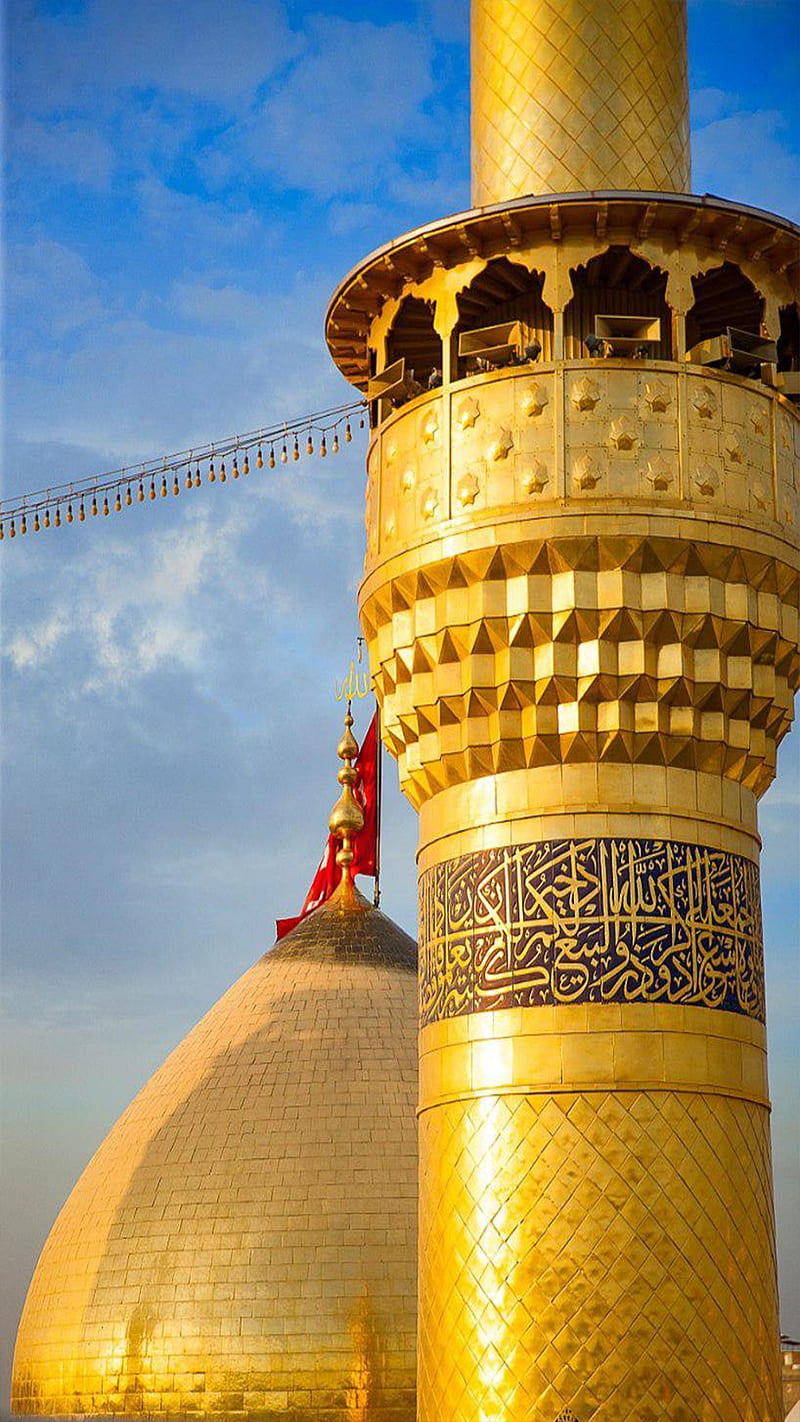
The rebels started pelting stones at Usman’s house. When it became too much, Usman’s son Aban ibn Usman came to Ali to ask for help.
In this regard, Aban ibn Usman said:
- I (Aban ibn Usman) went to Ali and said, “O uncle! We are being attacked with stones. When he heard this, Ali joined me and began throwing stones at the rebels until even his hands became fatigued.” (Ansab Ashraf, Volume 5)
Ali warned the rebels not to hurt Usman but the rebels ignored him and continued anarchy. When Ali noticed that they were defying him he asked the other Companions to put an end to the rebels.
It is written in Tarikh al-Tabari:
- Hakim ibn Jabir narrates that Ali said to Talha, “For God’s sake! Go and take these people away from Usman”. (Tabari Volume III)
Even before the siege, the rebels had entered Madina once before but they were sent back by Ali.
- Ibn al-Athir wrote about this incident, ‘Ali warned the rebels and sent them back to Egypt from Madina. (Ibn Athir, Volume III)
REBEL’S ASSUMPTION ABOUT USMAN
Ali asked the rebels, what fault do you blame on Usman? Among them was:
- Usman has made a meadow for his camels where others are not allowed.
- Burning of books
- Offering complete prayer during the journey.
- Appointing young men at important designations rather than the Companions.
After hearing these things, Ali said,
“He made the meadow for the donated camels so they could flourish, not for his own camels and goats. Umar ibn Khattab had also made a similar one for this purpose.”

He burnt those books that had controversial Hadith collections in them and preserved the non-controversial ones.
The reason for performing full prayer in Makkah is that he got married in Makkah and had intended igamah. In addition, he chose honourable and upright young people to serve as Emirs because the Holy Prophet also chose Khuwaylid ibn Asad to serve as Makkah’s Emir when he was just twenty years old. The Emir was also Usama ibn Zayd. Although some people criticised but the Holy Prophet declared him to be deserving of it. (Tareekh Ibn Kathir. Volume IV, Part VII and VIII, p. 173)
Ibn Khaldun wrote,
The Egyptians said to Ali, “We are disgusted with the rule of Usman. We want to pledge allegiance to you. We are going back now.”
Ali shook with anger and said in a harsh voice, “Indeed, the armies of Dhomar, Dhulchashab and Awadh are cursed according to the saying of the Holy Prophet and this hadith is known by all the believers. You people stay away from me and do not talk like this in front of me.” (Ibn Khaldun’s history, volume II, p 353-354)
THE REASONS BEHIND THE ACCUSATIONS AGAINST ALI IBN ABI TALIB
Now that it is obvious from the aforementioned references that Ali ibn Abi Talib took the initiative to assist Usman. Furthermore, it is essential to understand who accused Ali and why? What was the basis of those accusations?
- After the warning of Ali, the rebels went back. However, the rebels’ accusations about Usman had an impact on the residents of Madina, who also started to show suspicion. Ali was a great Companion so he advised Usman that if you assemble all the Muslims, give a sermon and clear their doubts then Madina will be calm and the rebels’ plot will fail because the success of the rebels only comes from causing unrest. It is crucial that you give a sermon because it will promote peace.
INCIDENTS ACCORDING TO HISTORY BOOKS
This incident has been described in the history books as follows:
- The first rebellion occurred in Madina with 600 rebels travelling there under the guise of performing u Usman urged Ali to send the rebels back before they entered Madina. With a few of his Companions, Ali went to the rebels, explained things to them and sent them back. Headequately responded to every complaint they had against Usman. Later, Ali reported this to Usman and asked him to gather the people and deliver the sermon. (Amir al-Muminin Syedna Ali pp. 274, 275)
- Then Usman gave a sermon at the request of Ali about which Ibn Kathir wrote, “Tears were flowing from Usman’s eyes and all the Muslims were crying.” (Tarikh Ibn Kathir, Volume IV, Part VII, 174)
- Ibn Khaldun writes about that sermon, “After saying this Usman wept as well as the crowd.” (Ibn Khaldun, Volume II, Part I, p. 375)
- Sultan-ul-Ashiqeen writes, “On the suggestion of Ali, Usman gave a sermon to the Muslim population and outlined his future course of Many individuals started crying after his speech which showed the impact it had on them.” (Khalfa–e–Rashideen p. 137)
WHAT WAS THE IMPACT OF THE SERMON BY USMAN?
If we consider the impact of this sermon, we can say that as a result of this one sermon, the rebels stayed away from Madina for three months. All the residents’ worries were dispelled and no one was ready to help them. The rebels sent messages in secret to the residents of Madina many times asking for their assistance in fighting Usman but no one responded, saying that the sermon from the leader of the believers had already shown them the truth about them.

THE LETTERS OF RESIDENTS OF EGYPT, KUFA AND BASRA
Only Ali made all of this possible. Why would Ali impede the rebels’ path if he was one of them? The truth is that they viewed Ali as their main foe. The rebels learned from this encounter that Ali was the only thing standing in their way. Usman’s caliphate cannot be overthrown if he continues to act on Ali’s advices. They intended to deceive people about Ali in this regard by spreading that Ali is against Usman and wants him to resign from the Caliphate. Thus, Usman would become enraged with Ali when he and his governors learn that Ali is involved in conspiracies against Usman. Even if it does not happen the mission will still be successful because in the name of Ali, people will depart from Usman and the Caliphate. In order to agitate people against Usman, they wrote letters to various recipients before returning to Madina for the second time and falsely attributed them to Ali and the other Companions.
- Ibn Kathir writes, “The residents of Egypt, Kufa and Basra falsely accused Ali, Talha ibn Ubaidullah and Zubayr ibn al-Awwam in their letters as well as the Companions who lived in Madina. They also conveyed messages to each other. They misled the people, incited them to fight with Usman as it was the biggest jihad of the age in their low opinion as it would flourish religion.” (Tarikh Ibn Kathir, Volume IV, Part VII, p. 175)
It is noteworthy and crucial to recognise that these letters served as the foundation for numerous myths that some historians have created. Different groups departed from Egypt, Basra and Kufa and stopped at a location outside Madina once the rebels were confident that newly converted Muslims had turned against Usman as a result of their letters. One troop camped at the place of Dhul Hashab and the other at the place of Dhomar. These people went to Ali and stated their purpose that Usman should be deposed.
- Ibn Kathir writes about the answer of Ali, “Ali was extremely displeasd with them and drove them away from there and said that the righteous people know that the Holy Prophet (pbuh) cursed the armies of Dhomar and Dhul H” (Tarikh Ibn Kathir, Volume IV, Part VII, p. 186)
Ibn Khaldun wrote,
- The Egyptians said to Ali, “We are disgusted with the rule of Usman. We want to pledge allegiance to Right now, we are going back.” Ali shook with anger and said in a harsh voice, “Indeed, the armies of Dhomar, Dhul Hashab and Awadh are cursed according to the saying of the Holy Prophet and this hadith is known by all the believers. You people stay away from me and I do not want to talk to you anymore.” (Tarikh Ibn Khaldun, volume II, pp, 353-354)
INCIDENT IN MADINA
The rest of the Companions also asked these cursed people to leave Madina immediately. They ultimately left dissatisfied. After a while, when all the Companions had gone back to their houses, Madina’s streets were in a state of turmoil and horses’ hooves could be heard everywhere. These rebels had encircled Madina. The People of Madina had no idea what they intended to do with them. Because such a political crisis had never occurred under a Caliph, the already poor situation was made worse and there was increased concern and terror.
Tabari has written about these situations,
- The residents of Madina were restricted to the confines of their homes and they did not venture outside. None of them sat without a sword in order to defend themselves from these rebels’ (Tarikh al-Tabari, Volume III, Part I, p. 403)
- Ali asked the residents of Basra and Kufa, “Why have you returned?” They claimed that upon returning, the Egyptians saw a messenger carrying a message ordering their execution. Ali caught their lie. It is in Tarikh al-Tabari that Ali asked them, “O people of Kufa and Basra! How did you learn about this incident when you had travelled to your homeland crossing many places and now you returned as a group? Sadly, this is a conspiracy that was set when you were in Madina. They replied that they want him deposed and do not need Usman.” (Tarikh Tabari Volume III, Part I, p. 400)
Payam Shahjahan Puri writes about this incident,
- Ali meant for the distance travelled by the people of Egypt to be equal to the distance travelled by the people of Kufa and Basra in different directions. When all the miscreants departed Madina at the same time toward their respective districts. The people of Egypt read the letter. In theory, only the Egyptians should have returned and the people of Kufa and Basra should have travelled on as they were unaware of the occurrence, but all three groups simultaneously returned to (Usman aur Usman ki khilafat, p. 377)
The rebels lied that Ali was the one who had written to them asking to return when they realised their lies had been exposed.
Rebels said:
- Then why did you write to us? (Tarikh al-Tabari, Volume 3)
Ali replied to them:
- By God, I have never written to you. (Tarikh al-Tabari, Volume 3)
These incidents prove that the people of Basra, Kufa and Egypt conspired against Ali. Due to the rebels’ conspiracy, individuals recount traditions that have absolutely no basis in reality.
Abdullah ibn Saba was a Jew who guised himself as Muslim. He accepted Islam during the reign of Usman. His aim was to destroy the unity of Islam. He was trying to make Muslims fight each other with the help of different beliefs and ideologies. He began a campaign for Ali to become the Caliph using the name Ali. He said that Ali was the Holy Prophet’s successor and that no one else had the right to hold the position of caliphate.
He gathered the Muslims who had a weak faith and forced them to stand up against Usman. People in faraway places and those who were unaware of the true nature of the curse started to realise that Ali was setting up opposition to Usman in order to grab control of the Caliphate. Furthermore, Abdullah ibn Saba would publicly acknowledge that Ali was aiding him in carrying out his plan. This evil person separated the umma and falsely blamed Ali in this manner.
Some historians also fell prey to the same propaganda and wrote that Ali wanted caliphate. This is a great insult to the glory of Ali. May Allah protect everyone from this. Amen!
It will be mentioned in detail in the next chapters where it will be discussed in detail how Ali always hesitated to take over the reins of the Caliphate until he was forced by the immigrants and the Ansar.
CANE OF USMAN
Usman went to the mosque on Friday after the rebels had returned to Madina and started to deliver sermon. Suddenly, someone by the name of Jhajah got up and began cursing Usman. This cursed person pulled the cane from him. This was the cane that the Holy Prophet used to lean on during the sermon. After the Holy Prophet it was used by Abu Bakr, then it came to Umar ibn al-khattab and then to Usman. Jhajah-ul-Ain pulled that staff and broke it by placing it on the ground. While breaking, its small piece of wood hit his knuckles and hurt him. That wound later turned into a fistula and worms also fell into the wound. As that staff was broken into pieces, Usman ordered that it should be put together. Usman came down from the pulpit and went home.
REBELS BESIEGED USMAN’S HOUSE
Once, as he was giving the Friday sermon, he was hit with stones which caused an injury and caused him to lose consciousness. He was taken home after being picked up. The rest of the Companions including Ali came to see him.
Ibn Sa’d wrote,
- Ali and a few other great Companions pleaded with Usman to allow them to eliminate the miscreants during this period. (Ibn Saad)
Since that day, the rebels besieged his house. This siege lasted for thirty days according to some traditions and others have said it lasted for forty days.
Tabari has written,
- According to Saif’s tradition, Usman’s siege lasted forty days and the stay of the rebels lasted seventy days. (Tareekh-e-Tabari, Volume III, Part I, p. 440)
Meanwhile, Usman strictly forbade everyone from unsheathing their swords.
Ibn Kathir writes,
- Usman told his slaves that whoever sheathes the sword will be free.” (Treekh Ibn Kathir. Volume IV, Part VII and VIII, p 183)
The rebels set ablaze the doors of his house. Both Hassan and Husayn ibn Ali were present there at the time. They got hit by the pelted stones and got hurt.
It is crucial to note at this point that some historians claim Ali departed Madinah in a rage because of Usman. This is sufficient evidence to convince these simpletons that Hasan ibn Ali and Husayn ibn Ali were present. If Ali had been upset, why would he have sent his two sons to guard Usman even though their own lives were in risk?
MARTYRDOM OF USMAN
The crowd of rebels had crossed the last line of provocation. They martyred Usman.
Tabari has written,
- These rebels stole everything from the house. Even the jewellery was snatched from the women.. The cloak of Naila bint al-Furafisa was taken. The rebels then declared that they would take the treasury’s contents. These individuals visited Bait-ul-Mal and robbed it as well. (Tareekh-e-Tabari, Volume III, Part I, p. 447)
Ibn Saad writes,
- The Bait-ul-Mal treasurer had 3.5 million dirhams and 1.5 million dinars on the day Usman was martyred, but they were all looted. (Taqabat Ibn Saad, Volume II, Part III, p. 146)
MOTHER OF THE BELIEVERS
These rebels also insulted the honour of Mother of the Believers, Umm Habiba.
Tabari writes,
- Mother of the Believers, Umm Habiba came riding on her mule and brought a bottle of water. People recognised and caught her. They slapped the mule on the face and cut the rope of the mule with a sword. She was almost martyred. (Tareekh-e-Tabari, Volume III, Part I, p. 441)
Some historians blame Ali that he sheltered the killers of Usman. This is a complete lie.
Even an ordinary Muslim who has a little bit of faith will die but will never shelter such people who are the killers of the Caliph Usman, robbers of Usman’s house, Naila’s cloak and Jewel snatchers.
If a common Muslim thinks it is better to die than to give shelter to evil people like him, then how will Ali, do this. Ali himself threatened the rebels that the Holy Prophet had cursed the armies of Dhomar and Dhulchashab. Then how it is possible that Ali will give them shelter after the martyrdom of Usman. Those who think like this should be warned not to lose their faith by being involved in a grudge against Ali.
The truth is that those who plotted to overthrow Usman in order to seize control for themselves also understood that the umma would rally around Ali after Usman. The same conspirators conspired against Ali for this reason because without this work they could not see success.
MARWAN IBN AL-HAKIM
On the basis of some directives issued by Marwan ibn al-Hakam, the rebels incited the populace against Usman. Usman was not even aware that Marwan had given these instructions. Ali used to warn Usman against Marwan because he believed it would prevent Marwan from achieving his objectives. As a result, Marwan also desired Ali’s removal from the way so he could carry out his own plans.
Usman was said to have given the rebels’ assassination orders in the letter that the rebels sent back to Madina under this pretence.
About this is in the book Tabari,
- Usman swore on Allah that he did not write the letter, was not aware of it and was never consulted about it. On this, Muhammad bin Muslim said, “God! You are right, but this seems to be the work of Marwan.” (Tarikh al-Tabari, Volume III, Part I, p. 428)
Various traditions exist regarding Marwan. He was a companion in some people’s eyes but he was not in the eyes of others. In any case, it is essential to discuss what the Holy Prophet said regarding Marwan using reliable references because his words are the finest justification and his language is blessed. Our faith is what we get as a result.

HADITHS
In this regard, some blessed hadiths are as follows,
- According to Abd al-Rahman ibn Awf, whoever had a child would bring it before the Holy Prophet, who would then pray for him. Marwan was likewise introduced in front of the Holy Prophet in a similar manner. The Holy Prophet said about him, ” He is the coward son of the coward father. He is the cursed son of the cursed father.” (Mustadrak Imam Hakim 8477)
- Abdullah ibn al-Zubayr says that the Holy Prophet cursed Al-Hakam and his child. (Mustadrak Imam Hakim 8485)
Holy Prophet said,
- I was shown in a dream that the sons of Al-Hakam ibn Abi al-As were climbing my pulpit like monkeys (climbing a tree). (Kanz al-Ummal 30846)
Abu Hurayra says that the Holy Prophet said,
- I was shown in a dream that the children of Al-Hakam ibn Abi al-As were frolicking on my pulpit like monkeys. (Mustadrak Imam Hakim 8481)
This hadith is authentic according to the standards of Imam Bukhari and Imam Muslim, but the Shuyukh did not narrate it.
Ibn Kathir writes that Ali said to Usman on one occasion regarding Marwan,
- Marwan would not concur with you if you do not give up your intellect and religion. By Allah, Marwan is not wise in terms of his faith and himself and I can see that he will confine you to such situation that he will never look back. (Tarikh Ibn Katheer, Volume, Part VII, p. 157)
Even when Usman’s wife Naila saw Marwan’s behaviour, she said to Usman,
- If you believe in Marwan, he will kill you because Marwan has neither the value of Allah, nor His fear, nor His love. (Tarikh Ibn Kathir, Volume 4, Part VII, p. 157)
According to Tabari,
- Marwan also always tried to incite Usman against Ali. (Tareekh-e-Tabari Volume 3)
Payam Shahjahan Puri has written his view on Marwan very clearly and openly,
- Those who have tried to make Marwan “حضرت” and “رضی اللہ” have made a joke with history. As far as the traditions that prove Marwan’s excellence are concerned, who does not have such traditions? After all, there are others who use fabrications like these and other bogus traditions to support the virtue of evil people like Yazid. People who are knowledgeable with history are aware that Banu Umaiah’s reign saw the development of factories for forging traditions. In opposition to him, the Banu Hashim adherents had also established factories for creating traditions and they had been creating wildly inflated customs in support of Ali and other Imams. An objective historian should steer clear of these two traditions and build the events on customs that are consistent with the personalities and temperaments of these people. Because they conflict with the overall principles and character of both Yazid and Marwan, the traditions that are used to demonstrate their superiority cannot be accepted. (Usman aur Usman ki khilafat, p. 378-379)
All these hadiths, facts and incidents prove how, when and why Ali was accused of being the helper of Usman’s killers. The fact is that Ali was the wall in the way of these miscreants and rebels and they used to consider Ali as their foe because the corrupt thought that when Ali would be offered Caliphate, he would leave the side of Usman while Ali did not leave the side of Usman even for a moment.
USMAN’S LOVE WITH ALI AND HIS UNWAVERING CONFIDENCE IN HIM
In order to demonstrate how much Usman trusted Ali and how Ali sought to assist Usman, a few situations will be described. Additionally, notice how they acted as a wall in front of the rebels. More occurrences and hadiths will support the notion that Ali and Usman had a close bond. In other words, two brothers will be mentioned whose bond was established by the Holy Prophet and therefore was stronger than blood. These two brothers’ foot dust serves as the crown of our heads as well as their shoes serve as the crown of our eyes. These two brothers are Usman and Ali.
USMAN AND ALI’S RELATIONSHIP BEFORE THE CALIPHATE
The relation of Usman with Ali dates back even before Usman received the Caliphate. Both of them were married to the daughters of the Holy Prophet. The Holy Prophet first married his daughter Ruqayya bint Muhammad to Usman then after the death of Ruqayya he married his second daughter Umm Kulthum bint Muhammad to Usman.
Al-Syuti has written that only Usman has the distinction of having two daughters of the Prophet among the children of Adam. While Fatima bint Muhammad was married to Ali. Ali had no dowry to pay when his marriage was confirmed. He went to the market to sell his armour. Usman rushed to the market as soon as he learned about it and bought the armour from Ali at the price he needed. That armour was then presented to Ali as a gift.
This incident is described by Ali as follows,
- ’ went to the market to sell my armour as the Holy Prophet had instructed. Usman approached me while I was strolling through the market and inquired about my reason for being there. I informed him that selling the armour was necessary to meet the wedding expenses. I had to sell the armour to Usman as he demanded. I received 400 dirhams from him for the armour. Usman grabbed my armour as I reached for the dirham and said, ’O Ali! The armour is now mine, and you own the dirhams’. I responded, ’Yes, you’re right’. Usman said’ Since I am now the owner of this armour, this armour is now a gift from me to you’. I brought the dirhams and the armour to the Holy Prophet’s service and told him about the incident’.
The Holy Prophet prayed for Usman. Usman was the witness when Ali got married to Fatima al-Zahra. Ali used to get gifts from Usman, demonstrating the closeness and strength of their friendship. Ali had a camel for ride from Usman. It is narrated from Anas ibn Malik that, ’When Ali came to the Holy Prophet, He had a camel with him. The Holy Prophet
asked, ’Where did this camel come from?" Ali replied, ’Usman has given it to me’.
USMAN AND ALI’S RELATIONSHIP DURING THE CALIPHATE
Both individuals were members of Ashara Mubashara, both migrated, both were declared martyrs, one of them died in Madina and the other in Kufa. While one protected the Qur’an, the other published, printed and gave it to the Umma. One is the pioneer of modesty and generosity, while the other is the crown of poverty and bravery. The grandfather of Abdullah ibn Abbas said, ’By God! Ali was Usman’s loyal and trustworthy friend.” (Tarikh Tabari, Volume III, Part I, p. 463)
What could be a better indication of a devoted friend than Ali being the first Companion to swear allegiance to Usman when he became Caliph?
After the martyrdom of Umar ibn al khattab, Shura had to decide on the new Caliph. Abd al- Rahman ibn Awf was given the obligation of making a choice by Shura. He said to Usman in the congregation, ’Raise your hand, you will be our Khalifa.’; Thus, they pledged allegiance immediately.
As soon as Ali heard Usman’s name, he charged into the crowd and made the first pledge of allegiance. Abd al-Rahman ibn Awf made the announcement but Ali was the one to pledge allegiance first. There is a tradition related to this that is mentioned in Sahih al-Bukhari. Abd al-Rahman ibn Awf said, ’O Usman! Raise your hand.’ Therefore they pledged allegiance to him, followed by Ali and the people of Madina. (Bukhari 3700)
In this regard, Ibn Kathir writes, ’People began to move towards Usman for the purpose of allegiance and Ali was the first to do so.’ (Tareekh-e-Ibn Kathir, Volume 4, Part VII, p. 149)
Hakeem Mahmood Ahmad Zafar writes,
- ’Abd al-Rahman was on the step of the pulpit at which the Prophet used to sit and Usman was at the lower step at that time. Hearing this from the mouth of Abd al-Rahman, a crowd of people surrounded Usman and began to pledge allegiance to him one after another. The first person who pledged allegiance to Usman was Ali.’; (Ameer ul Momineen Syedna Ali) Ibn Saad has written a tradition, ’Omro bin Umerah has narrated that I saw Ali the first among the people who pledged allegiance to Usman, then successive people came and they pledged allegiance.’ (Bakhuala Tabaqat Ibn Saad, Vol. II, Part III, p. 136)
It is in the ‘Tarikh al-Khulafa’ that when Abd al-Rahman asked Ali who he should pledge allegiance to (to choose the Caliph) then Ali replied’ Usman’. Ali served as Usman’s personal counsellor during his reign. Ali was given the duty by Usman to manage the Caliphate’s various issues in addition to implementing rules and regulations.
Professor Muhammad Javed Akram writes about Usman and Ali, ’If Usman wanted to punish someone, he frequently did so through Ali and with his advice." (Hazrat Ali Sheyre Khuda,p. 109)
A tradition is being recorded in this regard. Abu Sasan al-Raqashi Hussain bin Al-Munzir says,
- I went to the court of Usman. Al-Walid ibn Uqba, who had consumed alcohol was brought there and Humran ibn Aban and another man testified. Ali was told by Usman to prescribe punishment for him. Ali gave the command to Abd Allah ibn Jafar to flog Walid. Ali continued counting while Abdullah began to whip him, stopping when he reached forty.
The Holy Prophet administered forty lashes (as a penalty for consuming alcohol), Abu Bakr
administered forty and Umar administered forty bringing the total to eighty. And all of it is
sunna and I like this number (forty). (Kanz al-Umal 13686).
Along with this, Ali participated in combat along with his sons Hasan and Husayn during the
reign of Usman.
Arman Sarhadi writes,
- ’Even during Usman’s caliphate, Ali kept himself devoted to the service of Islam.’(Hazrat Syedna Ali Al Murtaza)
Hakeem Mahmood Ahmad Zafar writes,
- ’According to historical accounts, Ali served as Usman’s personal counsel during the Caliphate and his personal assistant during the time of mischief. Because he was a model of piety and sincerity and because he is Asadullah (the lion of Allah), it is impossible that he was acting in this manner out of hypocrisy. He also cannot have been acting in this manner out of fear because the lion of Allah is never afraid of anyone.’ (Ameer ul Momineen Sayyidna Ali, p 248)
Usman honoured Ali on special days the same way a someone honours his sibling or best friend. According to Ibn Ishaq’s father, Harith served as governor of Taif on Usman's behalf. He organised a supper for Usman, made indigo meat, wild sparrows and Barbary partridge for it and also invited Ali. When the messenger went to invite Ali, he was collecting leaves for his camel. He therefore arrived while cleaning the dust off his hands. ’Eat!’ Usman commanded him. Ali said that he cannot eat because he was in Ihram. (Sunan Abi Dawar 1849)
Abd Allah ibn Amir sent 3,000 dirhams to Ali as well as 3,000 dirhams to the entire population of Madina when he returned after conquering a territory. Usman expressed his resentment at Abd Allah ibn Amir after learning of this and remarked, ’This treatment with Ali?’ He then offered Ali 20,000 dirhams and some other gifts (which Ali accepted), and at the same time, apologised to Usman too. (Taqabat Ibn Saad)

ALI’S CONTRIBUTION TO THE SIEGE OF USMAN
Usman ran out of everything during the forty-day siege because the rebels cut-off the supply of food and water.
In this regard, Imam Tabari writes, ’His home had been entirely sealed up. However, Ali would frequently travel with some essential items.’ (Tarikh al-Tabari, Volume III, Part I, p 440)
Usman sent a message to Ali that, ’These people have cut-off water, if it is possible for the sake of Allah, send some water’ Usman sent similar messages to the other Companions and the sacred wives of the Holy Prophet (pbuh). So Ali and Umm Habiba came first to help. The rebels insulted Umm Habiba and knocked down her riding mule.
When Ali arrived, he said to the rebels:
- ’O people! You are not acting like believers or even nonbelievers. Do not stop supplies for the leader of believers (Usman) because he even feeds and hydrates people who are imprisoned in Rome and Persia. Why do you intend to slay him when did not engage in combat with you?’ (Tareekh-e-Tabari, Volume III, Part I, p. 441)
- Usman asked his well-wishers and family members for help when he was frightened of being assassinated, saying, ’You are seeing what these people have done, now what is the way out of this trouble?’
- They all suggested that he should call Ali and ask him to send the rebels home and fulfil their demands. Usman then called Ali. Ali arrived and Usman said, ’O Abu al-Hasan! You have heard what these people have said, and you have also heard what I said. Please take them back from me, they are after my life. On my behalf and on behalf of others, I will put an end to all of their complaints and satisfy all of their requests even if it means putting my life in danger.”
- Ali went to those people and said, ’O people! The rights you asked have been granted since the leader of the believers, Usman vowed to uphold justice for you on his own behalf and on behalf of others while leaving behind the things you find objectionable. After that, Usman and the rebels agreed in writing that he would settle all disputes within three days. In order to honour their agreement, they ended the besiege and returned." (Tareekh Tabari)
According to Ibn Asakir,
Ali sent Usman a message during the siege saying, ’I have 500 armed men, please allow me to defend you against these rebels!” Usman said, ’May Allah reward you well but I do not want anyone’s blood because of me.’
How is it possible to deny that in times of great difficulty and adversity, any king or ruler consults only close friends. Usman despatched Ali to talk with the rebels when they assembled in force and camped at the site of al-Marwah. When he met with them, he instructed them to ’Put the book of Allah (Quran) in front of you. ’Ali reached a settlement with them as the envoy of Muslim Caliph. (Sayedna Ali by Dr. Ali Muhammad Al-Salabi) One day, Usman was giving sermon when he was attacked with stones, injuring him and knocking him out. Everyone in Madina fled to their homes as the situation spread panic among the populace. Ali visited Usman at that time as well.
The date is recorded in Tabari, Ali went to Usman’s home when he was unconscious. They were surrounded at the time by Umayyads. Ali questioned, ’O Commander of the Faithful! How are you?’ (Tarikh al-Tabari)
Usman was about to testify when the rebels broke into his house. He was forced to leave the caliphate by the rebels. Ali drove them out of Usman’s home since they were not leaving and they had entered with the purpose to do harm and trouble.

MARTYRDOM OF USMAN AND ALI
Ali was in a state of severe shock when Usman was martyred.
Ibn Kathir writes, "After the martyrdom, Ali visited Usman's house and fell on him (in a state of shock) and grieved so hard that everyone assumed he was going to die as well. (Tareekh Ibn Kathir)
When Abu Jafar Ansari claimed that Usman had been martyred I went to Ali's service while he was in the mosque’s courtyard and wearing a black turban. I informed him, ’Usman has been martyred’. When he heard this, he said, Death be upon the murderers forever and ever.’ (Tareekh Ibn Kathir)
According to Ibn Qutaybah, ’On this occasion, Ali lost consciousness.’ (Al-Mamta Wal-Siyasta) He further writes, ’Ali’s senses were lost when he left Qasr-e-Khilafat.’ (Al-Mamta Wal-Siyasat)
Hakeem Mahmood Ahmad Zafar writes, Ali was so shocked by the martyrdom of leader of the believers that he fell on the blessed body of Usman while crying.
The situation was that the rebels forbade the funeral and burial and the residents of Madina refrained from leaving their homes out of fear. Ali played a crucial part in this situation, risking his life to arrange for Usman’s burial and funeral. He was accompanied at the time by a minuscule number of Companions. Ibn Kathir wrote, ’A small group of Companions accompanied the funeral, including Ali, Hakim ibn Hizam, Abd al-Uzza, Abu Huzaifa, Nayar ibn akram Aslami, Jubayr ibn Mutim, Zayd ibn Thabit, Kab Bin Malik, Talha, Zubair and some were the companions of Usman.’ (Tareekh Ibn Kathir)
WHERE IS USMAN IBN AFFAN BURIED?

Sultan ul Ashiqeen Says
Ali bashed the rebels and with the help of other Companions made arrangements for the burial of Usman. A group comprising of only seventeen people secretly offered the funeral prayer of Usman and buried him near Jannat al-Baqi. Due to the fear of rioters they had to even conceal the traces of his grave.
According to Malik ibn Anas, Usman, the leader of the believers reportedly paid a visit to Hash-Kukb part of Madina’s graveyard, Jannat al-Baqi. But he said that a good man would shortly be laid to rest here. He was therefore only executed as a martyr after that and the rebels severely interfered with his funeral preventing him from being buried to rest close to Rawdah Al Munawwarah or in a section of Jannat al-Baqi where distinguished Companions were buried, rather, he was buried in the farthest and most isolated place where no one would have imagined that the grave of leader of believers, Usman would be here because until that time there was no grave there.
- Ibn Abbas says that after the martyrdom of Usman, Ali said, ’If the people want, I am willing to swear by Allah in their presence at ‘Maqam-e-Ibrahim’ in the House of Allah that neither I killed Usman nor I ordered his murder rather, I forbade the rebels from doing so, but they disobeyed me. (Tarikh Ibn Kathir)
- Regarding Ali’s innocence for assassinating Usman, Ibn Kathir states, ’This is proven through so many references that it provides the confidence and certainty to narrators of Hadith." (Tareekh Ibn Kathir)
- Al-Tabari narrated,
Abd Allah Ibn Abbas says, ’God knows that I never observed Ali disobeying orders infact only saw his good intentions for Usman. He is heavily accused despite this.”
THE RELATIONSHIP BETWEEN USMAN AND ALI
Usman and Ali had a close bond that was so strong that only a small number of brothers shared it as is evident from the events and customs that have been related. Ali and Usman were already related. Ali’s aunt or his mother’s sister-in-law, Umm Hakim al-Bayda, was Usman’s maternal grandmother. They both loved the honour of becoming the Holy Prophet’s son-in-laws. In addition, Abd Allah ibn Umar ibn al-Khattab, Usman’s grandson was married to Fatima ibn Husayn who was Ali’s granddaughter. This demonstrates that the two of them remained together even after Ali and Usman passed away.
On many occasions Ali described the glory of Usman.
- It is narrated by Nizal ibn Sabra that Ali was asked to tell about Usman. He said that he is called Dhul-Nurain in heavens. The Holy Prophet guaranteed him paradise when he married two of his daughters to him. (Kanz al-Umal 36698)
Ali considered Usman to be the best after Abu Bakr and Umar ibn khattab.
- Umar and Nadr ibn al-Harith say that I heard Ali saying on the Prophet’s pulpit, “After theHoly Prophet, Abu Bakr was the best in this umma, then Umar and then Usman.”
Professor Muhammad Javed Akram writes about Usman and Ali, “Ali used to accompany Usman on his annual pilgrimage to Hajj.” (Hazrat Ali Sher Khuda p. 109)
Usman and Ali had such a close bond that Ali even named his son after Usman. Consider for a moment that when someone names their child after someone, it actually shows how much they adore the person for whom the name is being given.

ALI NEVER DESIRED TO RULE AS A CALIPH
Following are the false accusations against Ali that are levelled by rebels and plotters in an effort to cast doubt on his caliphate and diminish his status.
- Ali refused to pledge allegiance to Abu Bakr.
- Ali did not pledge allegiance to Umar ibn al-Khattab because he was disappointed that he was not selected as Caliph.
- Ali wanted to replace Usman himself as Caliph.
These accusations are wholly untrue. These false accusations are categorically refuted by facts and history.
Hakeem Mahmood Ahmad Zafar writes,
“The historical records provide unequivocal proof that Ali did not exhibit either a desire for the caliphate or a refusal to cooperate during the reigns of Abu Bakr, Umar and Usman. He worked with these gentlemen on all state-related matters because Ali recognised the position of these gentlemen.”
It is mentioned in Ghunyat Talibeen that Ali said, “The Caliphate would pass to Abu Bakr after the Holy Prophet, then to Umar, Usman and then to me, but there would be no congregation on me
Ali narrated that the Holy Prophet said to him, “After me, Abu Bakr will take the caliphate and people will gather around him, then Umar will take the caliphate after him and all the people will agree to them, then Usman will raise the caliphate.

Prophet Mohammad (pbuh) Informed Ali about Abu Bakr and Umar’s Caliphate
How is it conceivable for Ali to be sad about Abu Bakr, Umar and Usman’s caliphate even when the hadith is narrated by Ali and he is aware that they were chosen as caliphs? The Prophet himself stated so it had to happen. Therefore, all kinds of accusations are negated by these hadiths.
Then the Holy Prophet also said, “Follow the example of Abu Bakr and Umar after me.”
It was narrated from Hudhayfah ibn al-Yaman that we were seated with the Holy Prophet when he stated, “I do not know how long I will remain among you, so you people should follow those two who follow me.”
Similarly, it is in Mishkwat al-Masabih,
Hudhayfah ibn al-Yaman narrates that the Holy Prophet said, I do not know how much longer I will be with you; after me, you will continue to emulate Abu Bakr and Umar.
Abu Hurayra narrates, I heard the Holy Prophet saying, “I dreamed that I was at a well with a bucket on it. After I drained this bucket of water to the extent that Allah desired, Abu Bakr got hold of it and drained one or two buckets, but his tugging was not very strong. May Allah pardon his weakness. The bucket then grew significantly larger, Umar ibn Khattab picked it up in his palm. He took water from the well in the amount necessary so that people could water their camels.”
This dream also indicates the caliphate of Abu Bakr and Umar.
This dream foretells and heralds the establishment of the Abu Bakr’s and Umar’s caliphate.
Baseless Allegations about Ali
If a common man has minimal amount of knowledge, he will also be aware that the Holy Prophet gave the news of Abu Bakr and Umar’s caliphate. The conspirators tried to show that Ali always wanted the caliphate and was part of the scheme to depose Usman. These accusations were made explicitly so that the true conspirators may escape punishment for killing Usman and spreading disorder by raising questions about the place and standing of the Companions in the umma. May Allah guard us all against these temptations. Ameen
In this context, the narratives of several authentic historians are being presented in order to refute these false accusations and reveal the truth about the allegations against Ali.
ALI PLEDGED ALLEGIANCE TO ABU BAKR.
As far as Ali pledge of allegiance to Abu Bakr is concerned, he pledge allegiance along with all the companions. When the matter of pledging allegiance to Abu Bakr arose, Ali as preoccupied with the preparation and burial of the Prophet Mohammad (pbuh). It was not possible for him to leave the preparation and burial of the Holy Prophet and go to Saqifah (the place where the issue of caliphate was being discussed among the Ansar and Muhajirin). When the next day all the companions pledged allegiance to Abu Bakr, Ali was the first among them. The incident unfolded as follows:
WHY ALI DID NOT PLEDGE ALLEGIANCE TO ABU BAKR IN SAQIFAH?
The incident goes like this:
After the passing of the Holy Prophet, while the preparations and burial were still ongoing, some hypocrites gathered the Ansar in Saqifah and raised the issue of leadership after the Holy Prophet, questioning who would take charge of the affairs of the caliphate. The Jews played a significant role in instigating this matter as they had been waiting for a long time for the demise of the Holy Prophet in hopes of gaining power.
It was a very critical situation. The Ansar would have dispersed the Umma’s leadership if they had listened to the hypocrite’s words. If the facts of this case are examined, it is demonstrated that this topic was extremely essential. In actuality, the Holy Prophet had complete control over the umma after the Hijrah, especially over Madina. It is important to note that the entire Arabian Peninsula was under Muslim dominion, not only Madina. The majority of the tribes had adopted Islam, while the others gave the Muslims a capitation tax (jizya). In addition to this, the Holy Prophet had planned for the Islamic flag to be raised in Rome and Persia. When viewed in this light, a wrong decision in the case of the Caliph could have led to destruction.
Someone informed Umar and Abu Ubayda of the critical situation. Abu Bakr was busy making preparations for the Holy Prophet’s burial at the time. The two Companions quickly sent Abu Bakr a note, requesting that he listens to them. In response, Abu Bakr said he was too busy to come at this time. Then they warned that there was a serious issue at hand or things would get worse. Abu Bakr emerged from Aisha’s house and said, “What matter is more important than the bath of the Holy Prophet?”
Electing First Caliphate
According to the two companions, the hypocrites are pulling this ruse in Saqifah. It must be fixed right away, or else there is concern that the Umma’s unity will be broken. Along with some outstanding Companions, the three Companions departed towards Safiqah. Two comrades they encountered along the route, Asim bin Adiyy and Uwaim bin Sa’idah, asked them not to go there because the situation there had gotten out of hand and could not be controlled at the moment. Instead, they encouraged them to worry about their own lives. All the Companions arrived at Saqifah regardless of this opinion.
On this critical occasion, Abu Ubayda said to the Ansar, “O Ansar! You were the first to help Islam, and now you are the first to follow its destruction.
These words had a great impact on the Ansar. They had newfound faith and had forgotten what the hypocrites had said. Abu Bakr noticed that everyone was looking convinced at that very moment, making them realise that this was the finest opportunity. He took Umar’s hand in one hand and Abu Ubayda’s hand in the other before any hypocrite could suggest that the issue would occur again and said:
Pledge allegiance to whomever you wish among them. This is Umar, about whom the Holy Prophet said, “O Allah! Give honour and strength to the religion through Umar, and this is Abu Ubayda, about whom the Holy Prophet said, “He is the trustee of my umma.”

Umar Pledged Allegiance to Abu Bakr
Umar held Abu Bakr’s hand as soon as he heard these words and exclaimed, “I pledge allegiance to you.” He added that Abu Bakr had been given the task of leading the Muslims by the Holy Prophet, which is why he is the Caliph.
Abu Ubayda also took the pledge of allegiance and declared that, as Abu Bakr has the highest rank among the immigrants, he alone is deserving of the caliphate. The Ansar and the Muhajirun then started pledging their allegiance. If we consider this incident, it becomes clear that Ali was too preoccupied with making preparations for the Holy Prophet’s burial and bathing to be able to pledge allegiance to Abu Bakr in Saqifah on that day. Ali was one of those who pledged allegiance when Abu Bakr showed up in Al-Masjid an-Nabawi the following day.
Ali was among those who pledged allegiance to Abu Bakr the next day in the Al-Masjid an-Nabawi.
Umar appointed Abu Bakr as the successor of the Holy Prophet in Saqifah in the light of the Quran, and all the umma, including Ali, agreed with Umar.
Ali was at home when he learned that Abu Bakr was at Al-Masjid an-Nabawi for the pledge of allegiance. Out of fear that he might be late, he hurried to Al-Masjid an-Nabawi, pledged allegiance, and sat next to Abu Bakr before sending someone to get him a shawl and some clothes to put on. He then again sat there.
Ali Pledged Allegiance to Abu Bakr
This fact is crystal clear that Ali took the pledge of allegiance willingly and without any hesitation.
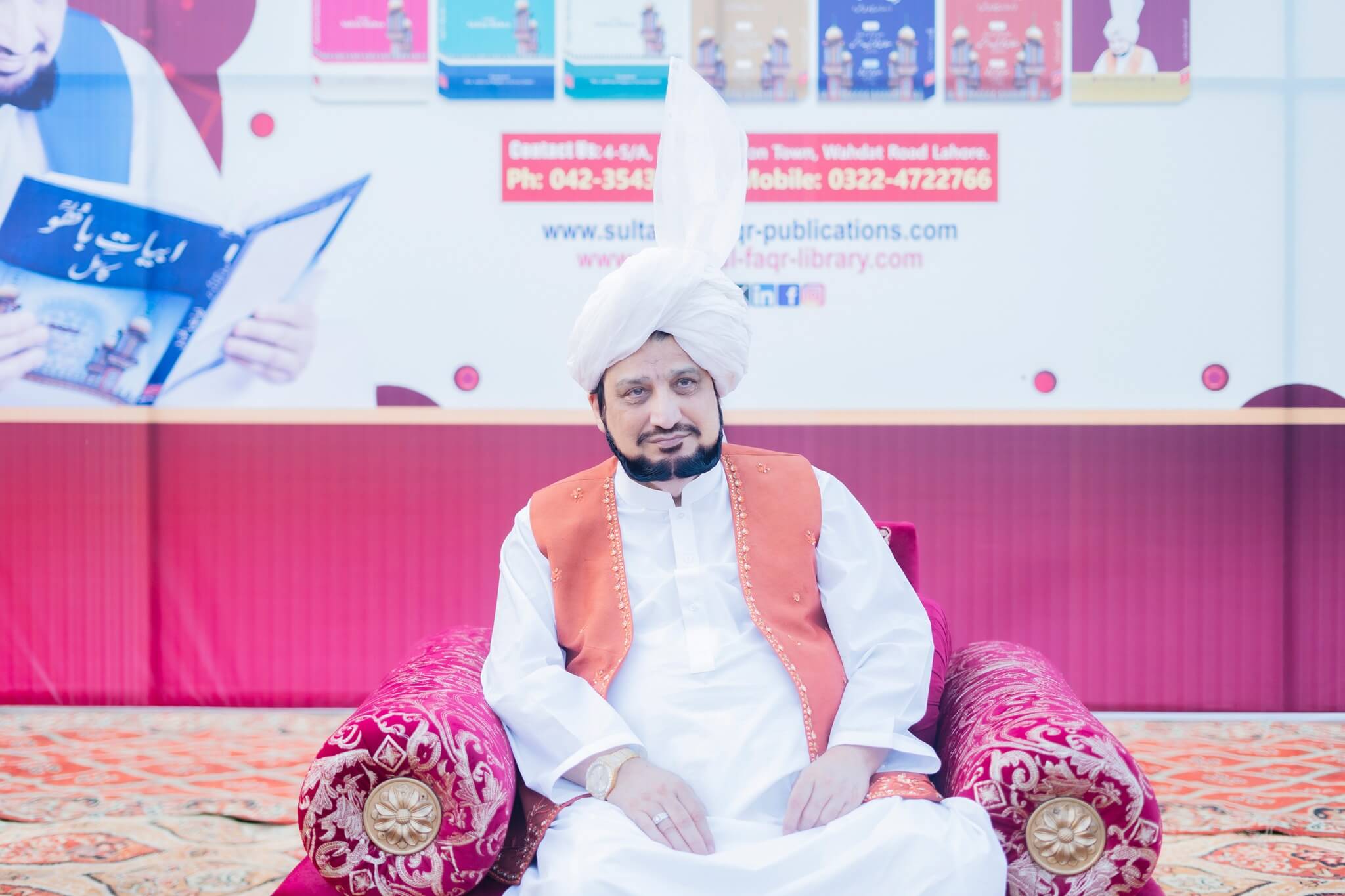
And Ali instantly swore allegiance to Abu Bakr out of concern that there would be a rift among followers of the Holy Prophet.
Ali said, “When the Holy Prophet departed, we thought about our affairs and chose for our world the person that the Holy Prophet had chosen for our religion because prayer is the origin and root of religion, and he was the defender of both religion and the world. As a result, we pledged allegiance to Abu Bakr, and the truth is that he was the only one qualified for it, which is why no one in his caliphate disagreed with him.”
Given that he had never sought the caliphate or run for it, all these tales demonstrate that Ali willingly and without reservation accepted Abu Bakr’s caliphate.
Abu Bakr was the Natural Choice of Muslims
Even an ordinary pious man never aspires to emirship or ministry. Let’s take an example here: If you (readers) were in that era, what would you have done when Abu Bakr became Caliph? Surely, you would immediately pledge allegiance to Abu Bakr. If your thinking as a common Muslim is like this, then at least do not degrade the position of Ali by saying that he expressed his displeasure at the caliphate of Abu Bakr because he wanted to be the caliph himself. The truth is that when Ali was asked about the caliphate of Abu Bakr, he said, “The Holy Prophet chose Abu Bakr for our prayers and for our religion; we also chose him for our world.”
A common Muslim believes that Abu Bakr receiving the order from the Holy Prophet to lead the prayers of the Muslims was a sign that he would succeed the Holy Prophet as caliph. Now, if a common Muslim can understand this, then would not Ali have understood this gesture?
A PLOT TO PERSUADE ALI TO OPPOSE ABU BAKR
Abu Sufyan ibn Harb came to Ali and said, “This does not make sense that the caliphate is given to the poorest and weakest of the Quraysh. Swear to God! If you wish, let me fill the whole field with horses and people.” Ali said, “O Abu Sufyan! Islam was not harmed by your long-standing enmity. Only Abu Bakr, in our opinion, is qualified to lead the Caliphate.”
Similarly, it is in Kanz al-Ummal.
It was narrated by Suwayd ibn Ghafla that Abu Sufyan came to Ali and Abbas ibn Ali and said:
Ali and Abbas! How did this government go to the most humble and small tribe of Quraysh? By Allah! If you want, I can kill this person with a whole army of cavalry and infantry.” Ali said to him, “No, I swear by Allah, I do not want you to go so far as to assault people on foot and by horseback. Abu Bakr will never be given the caliphate if we do not think he is deserving of it. O Abu Sufyan! While the hypocrites are treacherous to one another, believers are kind towards one another despite the distance between their homes and physical locations.
Even this effort continued during the caliphate of Ali. It is in Kanz al-Ummal,
Ali Ardently Defenced Abu Bakr’s Caliphate
It is narrated by Abd Allah ibn Umar that when Ali accepted the responsibility of the caliphate, someone addressed him as “O Commander of the Faithful!” You are the most eminent, how come the emigrants and the Ansar abandoned you and pledged allegiance to Abu Bakr? Ali replied, “By God! If the believers were not under the protection of Allah, I would have killed you, and if you had lived, you would commit sin. Abu Bakr has surpassed me in four things:
-
- Companionship excelled in the cave.
- Excelled in migration
- I believed in young age, while Abu Bakr believed in adulthood.
- He went ahead of me in standing prayer.” (Kanz al-Umal 36150)
In fact, The Banuamiyyah have long seen themselves as superior to other Quraysh tribes. The Banuamiyyah chieftains who converted to Islam continued to feel a sense of superiority and ethnic pride after the conquest of Makkah, and they believed that this gave them the right to lead the Muslim umma after the demise of the Holy Prophet. They could never possess the qualities of believers who believe that piety, not wealth, power, or race, is the mark of perfection. They had been passing the kingdom down from generation to generation for ages, so the idea of the caliphate was entirely foreign to them and repugnant. The basis for all intrigues against Usman and Ali will become clear if this fact is kept in mind, which means converting the Caliphate into a monarchy.

ALI PLEDGED ALLEGIANCE TO UMAR
The slanderers and those who have a grudge against Ali also allege that Ali had a grudge against the caliphate of Umar, although the facts are completely contrary to this.
When Abu Bakr became unwell, he exclaimed while gazing out of his house’s window, “O people! Will you all accept my will, as I have made it?
Everyone replied, “O Caliph! We are satisfied with this.” Ali, however, got to his feet and declared, “If this will is about Umar, then we are satisfied otherwise, not.” Abu Bakr remarked, “He is Umar.”
Ali said this because he was well aware of the order of the Holy Prophet. Later, Umar would be the caliph, and he wanted to be reassured that the will of Abu Bakr was in accordance with the will of the Holy Prophet.
Abu Bakr proposed Umar as his deputy and successor and presented a letter to the Muslims. It is in the hadiths that Sayyiduna Siddiq Akbar came to the upper house and addressed the people and said, “O people! I have made a covenant regarding the caliphate. Do you agree to it?” All the people replied, “O Caliph! We agree to this, but Ali said, “We will not agree to any other person except Umar ibn Khattab.”
Ali Genuinely Supported Umar
This reliable story demonstrates Ali’s genuine affection for Umar and his awareness of Umar’s desires. Ali was not only content with Umar’s reign; he also had a strong desire for Umar to succeed Abu Bakr as caliph. For this reason, he thought that Umar was the only candidate after Abu Bakr to rule the Imamate. He therefore declared, “We will not agree to anyone else except Umar.”
When Umar ibn Khattab became Caliph, along with other companions, Ali also pledged allegiance to him.
ALI PLEDGED ALLEGIANCE TO USMAN
- Abu Wail says, I said to Sayyidna Abd al-Rahman ibn Awf, “How did it happen that you people left Ali and pledged allegiance to Usman?” He said, “What did I do wrong here? I first approached Ali to pledge allegiance to him in accordance with the light of the Quran, the Holy Prophet’s sunna, and the disposition of Abu Bakr and Umar. He said, “I cannot afford it.” Then I presented this thing to Usman, and he accepted it. (Musnad Ahmad 12236)
This hadith makes it quite evident that Ali did not desire the caliphate; instead, he desired to make Usman the caliph, which is why he objected. Before being martyred, Umar assembled a council to choose a new Caliph. Umar’s decision that the Shura Council should elect the new Caliph was accepted by the whole Muslim Umma. Abd al-Rahman bin Awf received the instruction from Majlis-e-Shura that they will accept his recommendations. He decided that Ali or Usman should be appointed caliph. He asked Ali whether he would take over as Caliph, but he declined because he knew Usman would succeed him after he refused. Usman was therefore declared Caliph. Thus, we can conclude that Ali was crucial to Usman’s elevation to the position of Caliph.

Ali Supported Usman’s Caliphate
People began to move towards Usman for the purpose of pledging allegiance, and Ali pledged allegiance to him first.
At this time in history, Ali again pledged allegiance to Usman in the same manner as he did to previous Caliphs and he continued to assist Usman with the same devotion and support that he had shown to his predecessors.
It is clear from all these facts that Ali never desired the caliphate for himself but always gave allegiance to the chosen caliph with enthusiasm. Then not only pledged allegiance but also helped them in every matter and strengthened their caliphate with his useful advice based on wisdom. When Usman was given the caliphate, some vengeful people claim that Ali protested to Abd al-Rahman ibn Awf that he had abandoned him by not appointing him the caliph.
Ibn Kathir writes about these traditions:
Many historians have narrated from unknown people that Ali said to Abd al-Rahman ibn Awf, you have lied to me about what has happened, and you have made him (Usman) a caliph because he is your son-in-law and consults you every day about his affairs.
Abdul al-Rahman ibn Awf
Whoever breaks his covenant with Allah will suffer the consequences, and whoever keeps his promise to Allah will soon receive a tremendous reward from Allah.
And in the same way, many opposing reports that are not present in the books will be rejected by their carriers.
All these facts prove that Ali never wished for the caliphate, nor did he ever try, but he willingly and happily pledged allegiance to the three caliphs and contributed his best during their reigns.
Ali did not even make a nominal effort to attain the Caliphate.
Ali was forced to take over the caliphate
People from different social groups kept approaching Ali after Usman was martyred, pleading him to assume control of the caliphate but Ali consistently declined. Before the Companions arrived, the rebels approached Ali and requested his allegiance but he categorically rejected. Ali continued to reject the caliphate despite their threats.
The assassins assembled and went over to Ali after Usman was killed. Ali was at Medina’s market at that time. They said to Ali “Stretch out your hands, we pledge allegiance to you,” Ali advised against moving too quickly and said, “Umar was a very intelligent and fortunate individual for Muslims. The consultation committee (Majlis-e-Shura) had been left in his will. Give the populace a break so they can assemble and confer among themselves. Thus, they dispersed from Ali. (Tarikh al-Tabari, Volume III, Part II, P 18)
In this way, the rebels kept coming again and again but Ali sometimes refused and sometimes wisely avoided.
Even when the populace insisted more, Ali remained certain that he would not accept the emirate (caliphate). He then proceeded to the garden of Umar and Abd al-Rahman ibn Muljam and shut the door.
(Tarikh Ibn Kathir, Volume 4, Part VII, p. 266)
Ibn Kathir further wrote,
The Egyptians insisted on pledging allegiance to Ali but he went to a garden to avoid them. (Tarikh Ibn Kathir, Volume 4, Part VII, p. 227)
The rebels then went to the companions of Zayd ibn Ali and asked them to convince Ali to accept the Caliphate. They also threatened to begin killing their companions if they did not finish the task in two days.
When none of the Companions accepted the seat of caliphate, the miscreants got worried. The ignorant and the malicious ones among them wanted to go back leaving Madina in such an indecisive situation but the ones with a little wisdom could see polarizing situation arising in Madina, therefore, they did not want to leave without selecting a Caliph. Majority of them were from Egypt. Finally, they assembled the people of Madina and said, “You are the members of consultation committee (Majlis-e-Shura). Your ordain is implemented on the whole Mohammadan umma. Choose a Caliph from amongst you within two days. We will leave after pledging allegiance to whoever you choose. If you fail to do this, we will leave after killing so and so person.” (The Rashidun Caliphate, P. 189)

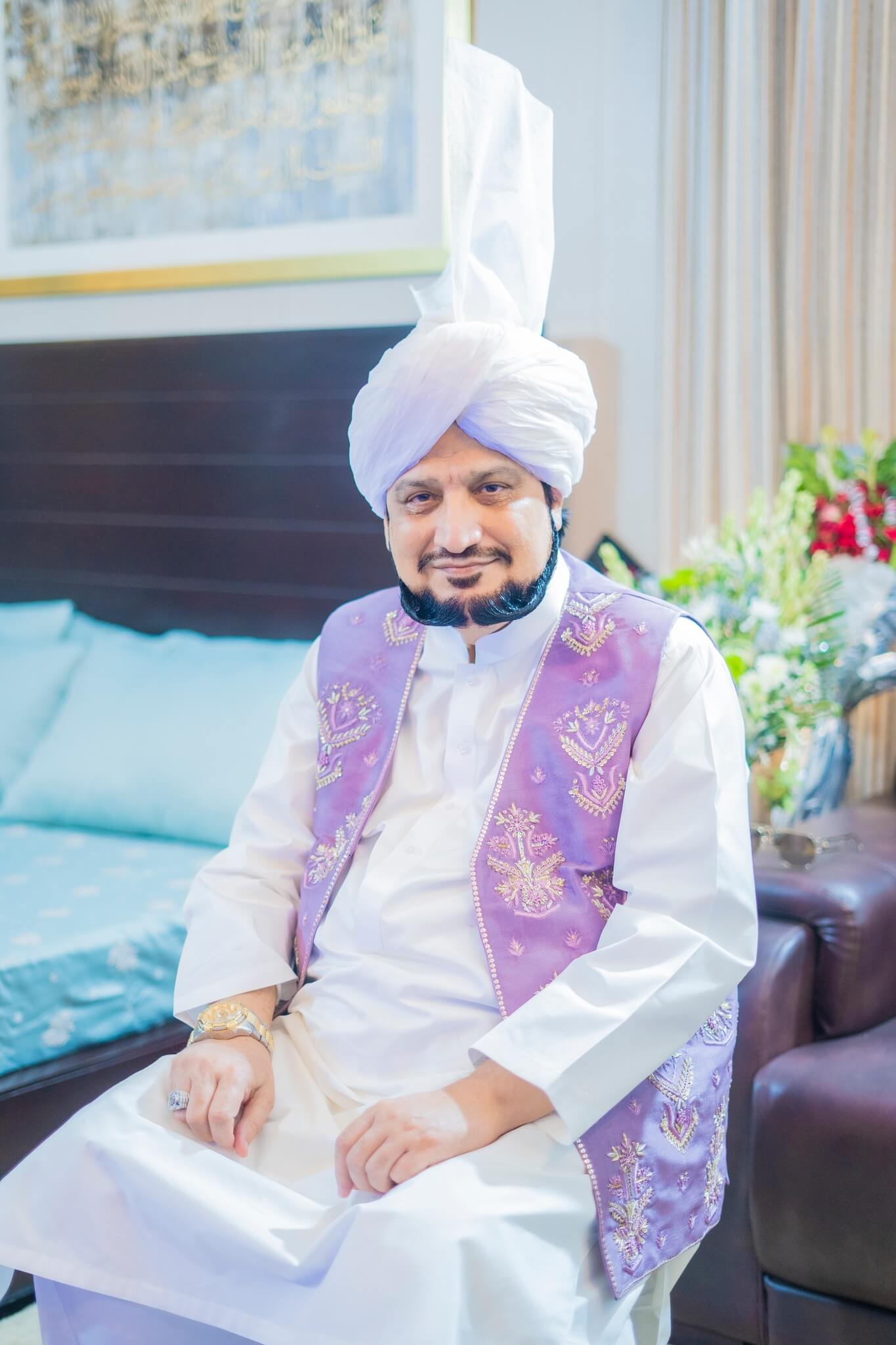
When the rebels came to terms with their defeat, they considered enlisting the help of the Ansar and the migrants in order to select one of these three (Ali, Talha, or Zubair) for the caliphate. Following this agreement, the rebels began visiting the Companions’ houses and demanding them to choose a leader for the Muslim umma. (Syed Na Ali Al-Murtaza, p. 143)
Ali refused to assume the responsibility of the caliphate despite the insistence of the Companions.
The Companions arrived at Ali’s house and informed him that Usman had been martyred and that the people now needed a leader more than anybody else since we do not want anyone on earth more than you. They don’t have a right to it. There isn’t anyone alive today who is more knowledgeable about Islam than you, and no one has a stronger bond with the Holy Prophet than you do. Therefore, you should take this responsibility and relieve others of their stress. (Tarikh Tabari, Volume III, Part II, p. 17)
Therefore, it is known from all trustworthy traditions that Ali was advised by the Madina residents and Companions of the Holy Prophet that this system cannot be established without a leader. A leader is necessary for the people, and right now, neither in terms of previous service nor in terms of proximity to the Holy Prophet, do we find anyone more deserving of this position than you. People continued to pressure Ali despite his refusal. (Khilafah and Malukite are 121,122)
The Companions gathered and requested Ali to pledge allegiance, but he refused. (Tarikh Tabari, Volume III, Part II, p. 17)
Ali avoided the companions so they would choose someone else because he did not want the responsibilities of the caliphate.
Following Usman’s martyrdom, the Ansar and the migrants persisted in helping Ali and pressuring him to accept the caliphate. (Tarikh Tabari, Volume III, Part II, p. 18)
Talha wanted to force Ali, so Ali said,
- “O Talha, raise your hand, I pledge allegiance to you.” But he said that you are the leader of the believers.
Tabari writes,
- Ali went to Talha and said, “O Talha! Spread your hand, I pledge allegiance to you.” Talha said, “You are more entitled to it than me and you are the leader of the believers . You should spread your hand.” (Tarikh al-Tabari, Volume III, Part II, p. 25)
When the Companions forced him, he said that I like ministry more than Emirate. So appoint someone else as leader and I will become his minister.
Ibn Athir writes that when he was forced more, Ali said,
- I prefer to be a minister than to be rich. I will pledge allegiance to whoever you choose. (Ibn Athir)
Ibn Khaldun writes,
After the martyrdom of Usman, a group of Talha ibn Ubayd Allah, Zubayr ibn al-Awwam, the migrants and the Ansar went to Ali to pledge allegiance. Ali said to them “Whoever you choose, I will also choose him.” All of them begged and said, “We do not find anyone more deserving of the emirate than you, and we cannot choose anyone else except you.” (Ibn Khaldun, Vol. II, Part I, p. 376)
Tabari also wrote the same,
Ali said, “It is better that you make someone else your leader and let me be his minister and it is better as well.” (Tarikh al-Tabari, Volume III, p. 17)
When he was still forced, he said that then there will be a general pledge of allegiance in the mosque.
How did Ali agree to take over the caliphate?
- Ali refused and the people kept insisting. Finally, he said, “My allegiance cannot be done secretly at home, it is not possible without the consent of the common Muslims.” (Khilafah o Malukite, p. 122)
Ali continued to try that if someone else accept the caliphate even after arriving at the mosque. Because of this, he declared as soon as he entered the mosque, “Yesterday, I was ordered to accept the caliphate, but I objected. Do you still hold the same views or have they changed? Therefore, everyone simultaneously exclaimed, “You are the leader of believers.”
Tabari writes,
When the Companions made excessive demands, Ali agreed to bear the burden of the Caliphate. (Tarikh Tabari, Volume III, Part II, p. 17)
Migrants and Ansar said to Ali, “We are not ready to accept anyone other than you as caliph.” (Tarikh al-Tabari, Volume III, Part II, p. 18)
In this way, Ali agreed to the caliphate due to the strong insistence of all the ansar and migrants.
Ali was persuaded by the Companions’ desire to become the leader of the Muslim umma and swore loyalty to him. They held the view that only he could save them from temptation. (Syed Na Hazrat Ali Al-Murtaza 143)
Thus, he finally agreed to the caliphate.
Dr. Taha Hussain writes about what was the intention behind assuming the caliphate,
Ali was asked to become Caliph by the ansar and the migrants in unison. Ali did not want to accept this proposal, but he could see the Muslim umma’s boat passing by in the distance. (Syed Na Hazrat Ali Al-Murtaza,p 144)
Ali, who was the most deserving and qualified for this (caliphate), agreed to it in order to prevent violence and division among the umma which would be most detrimental to the nation and the religion. There was a chance of harm. (Ihkam al-Qur’an with regard to Khilafat and Monarchy, p. 126)
According to the conspirators who supported the monarchy, Some of the Companions reportedly declined to pledge allegiance to Ali. In this way, an effort was made to make the caliphate of Ali contentious since those who planned to utilise Usman’s martyrdom to turn the caliphate into a monarchy could only remain hidden in history if they succeeded in doing so. The historians actually described a wide variety of traditions that were passed down to them. However, readers must also take responsibility for logic. That traditions should be taken on a rational basis.
This is the question that arises here. All the Companions of Zayd who sacrificed their lives, wealth and children for the sake of the Holy Prophet used to fulfill every word, is it possible that the Holy Prophet would describe the virtues of Ali above all others and deny his allegiance knowing the Companions?
Not at all, no. This is an attempt to slander Ali in order to silence critics of the conspirators and raise questions about the companions’ lack of commitment to Ali. In this regard, people make a few objections:
- Usman asked Ali to take over the caliphate.
- The Companions disagreed over Ali’s allegiance.
- Talha, Saad ibn Abi Waqqas, and Zubair pledged allegiance to Ali under the pressure or did not pledge allegiance at all.
- Many of the Ansar’s Companions of Zayd did not pledged allegiance.
- Many Zayd’s companions, even among the immigrants, refused to pledge allegiance.
A few authentic traditions are being narrated in this regard,
The assassins of Usman and the caliph of Ali
Furthermore, Ali is criticised for assuming the caliphate at the request of the assassins of Usman. Despite the Companions’ disagreements over his allegiance. This is wholly inaccurate. The customs already described make it obvious under what circumstances Ali accepted the caliphate. Therefore, this has no basis at all.
Some people think that the migrants, the Ansar and the Companions of Madina did not agree on the pledge allegiance to Ali. Only the corrupt individuals who took part in Usman’s martyrdom made him caliph. But authentic histories and reliable traditions contradict this idea. (Ali aur unki khilafat, p. 92)
Pledge of Allegiance of Saad Ibn Abi Waqqas, Talha Ibn Ubayd Allah and Zubayr Ibn Al-Awwam
As far as the pledge of allegiance of Talha and Zabayr is concerned, Ibn Khaldun writes about the pledge of allegiance to Ali in the mosque,
The members of the committee who were present pledged their allegiance to Ali after Talha and Zabayr did. (Ibn Khaldun, Part I, p. 376)
It shows that Talha and Zubayr were the first to pledge allegiance to Ali. In this regard, Tabari writes,
Bashir al-Najafi says that, When Usman was martyred, I was present in Madina. The migrants and the Ansar, including Talha and Zubyr, came to the service of Ali and said, “O Abu al-Hasan! Raise your hand so that we pledge allegiance to you.” Ali replied, “I have no need for caliphate. I am pleased with whomever you wish to appoint as caliph and I am with you in this matter.” The emigrants and the Ansar replied, “We are not ready to make anyone else the caliph except you.” (Tarikh al-Tabari, Vol. III p 18)
These traditions demonstrate how supportive Talha and Zubayr were of Ali’s pledge of allegiance. When Ali asked Talha to raise his hand so that Ali can swear allegiance to him, as was reported in the previous pages with reference to Tarikh al-Tabari volume III, Talha replied, “You are more entitled to it than I and you are the Commander of the Faithful, spread your hand.”
Regarding the pledge of allegiance of Zubayr, Talha and Saad ibn Abi Waqqas, Ibn Saad writes,
Ali was sworn in Madina and among them were Talha, Zabayr, Saad, Saeed ibn Zayd, Ammar ibn Yasir, Usama ibn Zayd, Abu Ayyub al-Ansari, Muhammad ibn Maslamah, Zayd ibn Thabit, Khuzayma ibn Thabit and all the Companions of the Holy Prophet who were in Madina, pledged allegiance. (Taqbat Ibn Sa’d, Vol. II, Part III, p. 175)
The first to pledge allegiance to Ali was Talha. (Tarikh Yaqubi, Volume II, p. 288)
All the Anasr Pledged Allegiance to Ali
Tabari writes,
None of the Ansar refused to pledge allegiance to Ali. (Tarikh al-Tabari, Volume III, Part II, p. 22)
Most scholars agree that Ali had received the allegiance of the Ansar and migrants of Madina (Azalah al-Khata with reference to Ali and his Caliphate, p. 93)
Talha, Zubair, the Ansar and the migrants pledged allegiance to Ali. (Yaqoobi History, Volume II, p. 288)
It was therefore established that the mindset used to challenge Ali’s pledge of allegiance lacks an understanding of the age of truth.
Reference books
- Khilafat o Malokiat, (author: Syed Abul Ali Maududi, twenty-sixth publication, Interpreter Institute)
- Al-Qur’an (Pvt. Ltd., Urdu Bazaar Lahore)
- Tabaqat Ibn Saad, Volume II
- Tarikh Yaqubi, Volume II
- Azaltah al-Khafa with reference to Ali and his caliphate
- Syed Hazrat Ali Murtaza
- Ibn Khaldun, Volume II

The Conspiracy and its Motive
It is essential to comprehend the conspiracy that took place against Usman in order to comprehend the challenges faced in the Caliphate during the reign of Ali. Because the same conspirators who fought against Ali secretly were also those who martyred Usman. Although there were different faces in the public eye, the conspirators remained the same. The same conspirators made a concerted effort to split the Muslim umma and keep Muslims at odds with one another in order to consolidate their authority.
To comprehend how the conspirators were hurting the caliphate in this setting, various incidents are being related. However, Usman was made to appear powerless while his commands were not carried out. The conspirators began meddling in the Caliphate’s affairs to such an extent that they began sending fake instructions on Usman’s behalf throughout the empire without anyone knowing, not even Usman.
Deep state
Even if Usman had been aware, he would have been powerless to take any action against these individuals, given their elevated status, which rendered them immune to accountability. This was the tragic catalyst for Usman’s martyrdom. In the present era, this type of power is often referred to as the Deep State, a covert form of governance that operates beyond legal boundaries when employing force to advance its goals.
It is not just out of bounds of the legal system but also for the executive branch of government. The Deep State, the Shadow Government, and the State within the State are some of its names. It typically consists of a nation’s police, bureaucracy, and military intelligence. Any one of these institutions or a mixture of all of them, may exist depending on the circumstances of the nation. The Turks were the first to learn how to use power covertly. They were surprised and perplexed that they issued orders, but something else was happening, and their orders were being changed. They gave the hidden power the name “Deep State.”
Incidents Illustrating Challenges During Usman’s Caliphate
In this context, some incidents are being narrated which prove that the last period of Usman’s caliphate faced these difficulties.
The rebels had a letter with them when they made their third incursion into Madina with the goal of killing Usman. They claimed that Usman had written this letter against them and that it called for their execution or other severe punishment as soon as they arrived in Egypt. Usman’s servant was the one carrying the letter, and he was riding on Usman’s camel. He was captured by these rebels, and a letter bearing Usman’s seal was recovered from him.
Usman’s Response to the Accusation and Dispute
Ibn Kathir writes:
The messenger, a slave of Usman, was riding his camel as these individuals carried the letter and displayed it to the crowd. Usman answered the people of Madina when they asked him about the letter, “Bear witness to this letter, by Allah! I neither wrote this letter myself nor did I instruct someone to do so, and I have no idea who it is from. The seal itself can possibly be fake too.” Consequently, the Sadiqeen supported what Usman said, while the liars refuted it.
Tabari writes about it:
When these individuals approached Usman and inquired, “Is this slave yours?”
He replied, “This slave went away without my knowledge.”
They asked, “Is this your camel?”
He replied, “He took it from my house without my knowledge.”
They asked, “Is this your seal?”
He replied, “Someone else must have done it.” (Tarikh-e-Tabari, Volume III, Part I, pp. 420-421)
Analysing the Improbabilities: Was Usman Framed?
Can any sane individual believe that someone would send someone with such a crucial message on a camel or a horse in the event that there was a revolt threat throughout the entire empire?
Second, how could Usman send his camel when he was aware that the Egyptians were using the same route to return? With only one camel at his disposal, which he kept for Hajj purposes, Usman would never have dispatched that camel if the intention was to use it for delivering the letter, as this would have made it conspicuous to the rebels from a considerable distance away.
Thirdly, if Usman had to send it, he would not have sent it over the same path but rather would have instructed them to go down a different one.
The fourth point is: why would Usman send his slave when the Egyptians could see right away that he was Usman’s slave? If he had to send a letter, he would have sent it with someone else so that even the rebels wouldn’t have suspected.
If all these facts are taken into consideration, it becomes clear that Usman was framed.
This event indicates that the conspirators had infiltrated the Caliphate to the point where they were employing Usman’s seals, horsemen, and slaves without his knowledge or consent.
Conspirators’ Tactics Against Usman and His Forgiving Nature
The conspirators were well aware that keeping Usman away from Ali was crucial to destroy the caliphate of Usman since, without doing it, it would have strengthened the caliphate and they would have been unable to carry out their evil plans. In this regard, they employed several ruses.
Ali informed Abd al-Rahman ibn Al-Aswad that Usman had visited him the day before and promised not to repeat the incident and to heed his counsel.
Ali further said to Usman that after he spoke from the Holy Prophet’s pulpit and made a commitment, Marwan barged through his door and verbally and physically assaulted the audience.
Ali said, “Marwan prevented Usman from his intention.”
Even Na’ila bint al-Furafisa said to Usman,
“You should call Ali since many have forsaken you because of Marwan.”
Usman was extremely gentle and forgiving. Conspirators took advantage of these qualities. The first person who insulted him was Jabla bin Umro Saidi. Usman was very generous of heart. Despite the insult in the crowded market, he did not punish him, nor did he allow anyone else to take action against him. Afterward, conspirators and rebels became even bolder. In every matter related to his own person, Usman continued to forgive people until he was martyred.
Usman’s Non-violent Stance and the Conspiracy Unfolding
Usman was adamantly opposed to violence and bloodshed within the umma. Usman’s opponents planned to fight under a number of pretexts when they noticed that Usman was not even showing up for the fight despite all of their antics and insolence. They somehow managed to instigate an issue from Usman’s side that ultimately led his martyrdom.
In this regard, Tabari writes,
It is narrated by Hudhayfah ibn al-Yaman, “I was an Arab slave in the desert. Because Marwan liked me, he bought me, my wife, and my child, then set us all free. I then moved in with Marwan. The Umayyads were in charge of protecting Usman throughout the siege, and Marwan moved into his home. I was with Marwan. I was one of the people who started the conflict by shooting a member of the Islamic tribe from Usman’s roof. This led to the start of the war.”
The nature of the conspiracy becomes evident from the fact that, eighteen days after the siege of Usman (which, according to Saif, lasted forty days and saw the rebels’ stay extend to seventy days), travellers from other cities arrived and reported the movement of relief forces from various nations, including Habib ibn Muzahir, Mu’awiya, and Al-Qa’qa ibn Amr al-Tamimi leading them.
But as recorded in history, no military aid was ever provided. The people of Madina kept waiting until Usman was martyred.
Tabari writes in this regard,
Usman addressed a letter to Mu’awiya in Syria when he realised the situation had turned against him. When Mu’awiya received this message, he continued to wait for the right moment.
Usman’s Appeals for Assistance and the Rebellion’s Demand for Abdication
Dr. Taha Hussain writes,
Mu’awiya delayed sending any troops or arriving to offer assistance since the rebels had Usman in their grasp.
Usman requested assistance at the time in letters to other governors and authorities, but no assistance materialised. Various traditions surround how this assistance got to that location or came close to Madinah. All renowned historians concur, however, that Madina was unable to get any assistance.
Usman requested assistance from several governors and wrote a letter to Amir of Syria, Abdul Aziz, but he responded ignorantly and to such an extent that his behaviour led to Usman’s martyrdom.
Such a situation had never occurred before during the tenure of a caliph, but the plot had deteriorated to the point where the rebels openly urged Usman to renounce the caliphate. The rebels told Usman to abdicate, claiming he was unworthy of the position of caliph.
The Holy Prophet had instructed Usman to not give up the caliphate, hence Usman did not to leave it.
In this regard, there is a hadith in Musnad Ahmad,
It is narrated from Aisha bint Abu Bakr that she said: “The Holy Prophet sent a message to Usman ibn Affan. When he came, the Holy Prophet paid special attention to him. When we saw the Holy Prophet in this state, we gathered on one side so that he could speak freely with Usman. The conversation continued, and in the end, the Holy Prophet placed his hand on Usman’s shoulder and said, ‘Usman, I hope that soon Allah will clothe you in a shirt. If the hypocrites demand that you remove this shirt from yourself, do not take it off until you meet me.'” The Holy Prophet repeated this statement three times.
The Prophecy and Turmoil During Usman’s Later Caliphate
Ibn Saad writes,
The Holy Prophet said to Usman, “Allah Almighty will one day clothe you in a shirt. If the hypocrites wish to make you take it off, do not remove it for any wrongdoer.”
In the final years of Usman’s caliphate, there was a rise in turmoil and strife. In his book, Muhammad Rida Misri writes:
“The turmoil in Kufa had reached such a point that people would sit in their gatherings and curse Usman (R.A) and Saeed (the governor of Kufa). People were gathering in large numbers for this purpose. Saeed and the dignitaries of Kufa wrote about this situation and requested Usman to remove them from there.”

There are various traditions regarding the fitna against Usman ibn Affan:
Abu Umar relates from Sa’id ibn al-Musayyib that Zayd ibn Kharijah died during the caliphate of Usman. After he was shrouded, people first heard a strange noise from his chest and then he started saying, “Ahmad (Prophet Mohammad) is named ‘Ahmad’ in the earlier Book (i.e. Bible). The truthful is Abu Bakr Siddiq who is weak regarding his self but strong for the cause of Allah as is mentioned in the earlier Book (Bible). Umar ibn Khattab is also truthful and strong trustee according to the earlier Book (Bible). Usman ibn Affan is also truthful and is on their footsteps. Four years of his caliphate have passed and after two years there will be the period of fitna when the strong will crush the weak.”
(Izalatul Khafa, Vol IV, pp. 99-100)
In reality, the rebels did not demand Usman to withdraw from the caliphate on arriving in Madina, instead, they had been conspiring for it for a long time.
Mohammad Raza Misri writes:
Yazid ibn Qays decided to raise the demand of Usman’s removal from the caliphate in the form of a proper movement. The followers of Abdullah ibn Saba whom he had brainwashed against Usman assisted Yazid in this movement.
(Usman Ibn Affan)
Amr ibn al-As: Dissent Against Usman’s Caliphate
Some authentic historians have mentioned that Amr ibn al-As was also against Usman. In this regard Mohammad Raza Misri writes:
Usman felt the graveness of situation and summoned the governors of all the provinces for mutual consultation. When Amr ibn al-As was asked to give opinion, he said, “O Caliph! I think you have burdened your people. You must focus and work harder for equality and justice. Otherwise you better withdraw yourself from caliphate. If you do not wish to do so then please be courageous and take bold step.”
(Usman Ibn Affan p. 223)
Al-Waqidi states that when Usman deposed Amr ibn al-As from governorship of Egypt, he got enraged and turned against Usman.
(Usman Ibn Affan p. 222)
Tabari writes:
Amr ibn al-As came to Madina and started objecting to Usman. Usman called him in privacy and said, “How quickly you have started expressing your rancour by taunting and mocking me! You have many faces. By God, if your inner was not polluted with malice you would not have bad-mouthed me.
(Tarikh al-Tabari, Vol. III, part one, p.406)
Doctor Munawwar Hasan Cheema writes:
Amr ibn al-As asked Usman to do justice or leave the caliphate.
Ibn Kathir writes:
Amr ibn al-As developed grudge against Usman and talked according to his inner state. He took pride in his father and said to Usman that he was more honourable than him. Usman asked Amr to not discuss such petty things. Amr started uniting people against Usman.
(Tarikh Ibn Kathir)
The Agitator Against Usman’s Rule
Tabari has written:
When Amr ibn al-As left Madina and started living in Palestine he used to say, ‘By God! Even if I met a shepherd I would incite him against Usman.”
(Tarikh al-Tabari, Vol. III, part one, p.412)
Conflict between Usman and Amr ibn al-As got worse. Tabari writes:
Usman’s step sister Umm Kulthum bint Abi Muayt was married to Amr ibn al-As. When Usman deposed him, he divorced her.
(Tarikh al-Tabari, Vol. III, part one, p. 408)
Tabari writes at another place:
One day Amr ibn al-As was sitting in his palace with his two sons, Mohammad and Abdullah, and Salamat bin Awj Jazaami. A rider passed by. Amr asked him, “Where are you coming from?” He replied, “From Madina.” Amr inquired him about Usman, he said, “I have left him in the state of extreme siege.” After a while, another rider passed by. Amr asked him as well about Usman and he told that Usman got martyred. Upon hearing this Amr ibn al-As uttered, “When I touch a wound, I make it burst. I instigated people against him so much so I incited the shepherd who grazes the sheep on mountain top.”
(Tarikh al-Tabari, Vol. III, part one, pp. 407-408)
Arman Sarhadi writes:
Amr ibn al-As said to Usman, “O Caliph! Your unbalanced behaviour has aroused people to protest. There are only two options to redress it; either do justice or withdraw yourself from caliphate.”
(Syedna Ali al-Murtaza)
Propaganda in Egypt and Kufa
Tabari further writes:
One day when Usman delivered a speech Amr said to him, “You have spoken many unpleasant things.”
(Tarikh al-Tabari, Vol. III, part one, p. 419)
Ibn Khaldun writes that when Usman was giving the sermon, people started raising voices against him. “O Usman! Fear Allah and turn towards Him.” First person to say so was Amr ibn al-As.
(Ibn Khaldun Vol. II, part one, p. 356)
As far as the situation in Egypt is concerned, propaganda against Usman was so strong that everyone wanted to make reforms in the matters of caliphate leaving their obligation of jihad.
Mohammad Raza Misri writes:
People’s minds were so much polluted with propaganda against Usman that reforms in Madina became more important for them than jihad. They openly uttered such things against Usman that were never said before against any Caliph.
(Usman Ibn Affan)
The conspiracy was at its peak in Kufa as well. Whomsoever Usman appointed as the governor, people objected on him. Whatever steps he took for the betterment were wasted due to propaganda. He had to change many governors just because the rioters demanded to remove them. Mohammad Raza Misri writes in his book Usman Ibn Affan that when Usman was pressurised to change the governor, he said, “I am accepting their demand for the sake of appeasement only.”
He further writes:
The sedition had started and was about to get worse. Therefore, the Companions wrote letters to each other to discuss the severity of incidents. They collectively requested Ali ibn Abi Talib to discuss the situation with Usman.
(Usman Ibn Affan)
This gives a clue how prevalent was the fitna.
Abdullah ibn Saba’s Subversive Beliefs
The fitna of Sabaiyya group was also extremely dangerous. Abdullah ibn Saba initiated and led it. He was a Yemenite. His mother’s name was Sawdah, which was why he was also called Ibn Sawdah. He was basically a Jew but hypocritically accepted Islam in the reign of Usman. He was determined to create discord among the Muslim umma and for this purpose he started introducing new beliefs. Because, when people have different beliefs, they divide in sects and groups. Hence, they lose unity and strength and eventually face downfall. Moreover, Abdullah ibn Saba preached such beliefs which Muslims would readily accept and caused their rapid decline. One of the beliefs was that real successor of the Holy Prophet was Ali ibn Abi Talib. That is, he was the one who rightfully deserved the caliphate. Other than him, whoever claimed caliphate was a liar.
Tabari writes:
Ibn Saba spread the notion that all the earlier Prophets had nominated their successors and Ali ibn Abi Talib was the nominated successor of Prophet Mohammad. Just as Mohammad is the seal of all Prophets, Ali is the seal of all successors of Prophets. He incited people by saying, “Cruel are the ones who disregarded the will of the Holy Prophet by taking the rule of Muslim umma in their hands and usurped the right of the Prophet. Usman has unjustly occupied caliphate. Since the rightful successor of the Prophet is present, you all must stand in his favour. Start your mission by criticising and mocking the rulers.”
(Tarikh al-Tabari, Vol. III, part one, p. 382)
Abdullah ibn Saba’s Coordinated Sabaiyya Conspiracy
In this way, he made many newly converted Muslims to join him by using the name of Ali. Such conspiracies of Ibn Saba added fuel to the fire and already bad circumstances worsened quickly. He travelled to Kufa, Egypt, Syria, Basra and other places to join people with him. Even he established a party in the favour of Ali. The notion of Holy Prophet’s successor became popular among the newly converted Muslims. Unanimity of people upon this belief actually meant that they considered caliphate of Usman doubtful. This sowed the seed of hatred for Usman in their hearts. Also, Ibn Saba and his followers made sure to adopt superficial piety and asceticism so that wherever they go, people would consider them virtuous. It is a human nature that if they see someone doing good deeds, they willingly accept their word thinking that they cannot be wrong.
The conspiracy of Sabaiyya group was very organised. To put it into action, Abdullah ibn Saba visited all the Arab and non-Arab regions and specially met the criminals whom Usman’s governors had punished. They already had grudge against the governors. Ibn Saba provoked them to force Usman to change the governors and assured them that it will improve the situation. Hence, a large number of criminals joined him. He also falsely blamed that Ali also wanted that everyone must stand against the governors. Sultan-ul-Ashiqeen writes about Ibn Saba:
The Growing Gravitas of Fitna and Conspiracy
The biggest enemy of Islam was a hypocrite Abdullah ibn Saba who in fact was a Jew but pretended to be a Muslim. Jews were the worst rivals of Muslims and were trying to erase the existence of Islam since the era of the Holy Prophet. When the caliphate of Usman began to weaken, the Jews started bashing him. Ibn Saba was cunning and conniving. He initiated propaganda against Usman and Umayyads that they usurped the right of Hashim tribe to the seat of caliphate. He corrupted the views of some Muslims by claiming that the Holy Prophet will return to this world just like Isa (Jesus).
(The Rashidun Caliphate)
We can imagine the graveness of fitna and conspiracies by the fact that Ayesha, the beloved wife of Prophet Mohammad, wanted to play her role in making the conditions favourable for Usman before leaving for Hajj. However, when she cognised that those who had gathered against Usman will neither spare him nor anyone else who would confront them, she thought it was better to set for Hajj.
Ibn Kathir writes in this regard:
When the mother of believers Ayesha set out for Hajj, people requested her to stay as the agitators might fear her before taking any extreme step. She replied, “I am afraid if I express my stance about them, I will also have to face the insult that Umm Habiba had to.”
(Tarikh Ibn Kathir)
A Conspiratorial Turning Point
Many revered Companions secluded themselves on observing the situation.
Tabari writes:
When Talhah ibn Ubaydullah and Zubayr ibn al-Awam came to know that the agitators had treated Ali and Umm Habiba so badly, they restricted themselves to their homes.”
(Tarikh al-Tabari, Vol. III, part one, p. 442)
Tabari writes about the conspiracy:
Miswar bin Makhramah relates that the people of Egypt wanted to martyr Usman without having a war. However, Iraqi militants arrived from Kufa and Basra, and Syrians also provided aid which encouraged them.
(Tarikh al-Tabari, Vol. III, part one, p. 451)

Martyrdom of Usman and the Door to Fitna
Usman ibn Affan was martyred in such circumstances that were a prelude to fitna. The Holy Prophet had already predicted about the befalling of fitnas one after the other:
Huzaifa bin Yaman relates, “We were in the company of Umar ibn Khattab, he asked, ‘Does any of you remember any Hadith of the Prophet regarding fitna?’ I replied, ‘Yes, I think I remember his words exactly.’ Umar said, ‘You were the most daring to inquire the Prophet about fitna.’ I repeated the words of the Holy Prophet, ‘Man’s family, wealth, children and neighbours all are fitna. Whereas, salat, fasts, charity, commanding for good and forbidding from evil is atonement for it.’ Umar said, ‘I am not asking about this. Tell me about the fitna that will rise and grow like the raging waves of sea.’ I said, ‘You need not to worry about it. There is closed door between you and that fitna.’ Umar asked, ‘Will the door be opened or broken?’ I replied, ‘It will be broken.’ Umar exclaimed, ‘This means it could never be closed again’.”
Shaqiq bin Salama says:
That they asked Huzaifa. “Did Umar know about the door?” Huzaifa said, “Yes he did, just as he was sure about the falling of night after the day.” Since people were afraid of asking Huzaifa what was meant by the door, they requested Masruq ibn al-Ajda to ask. On his enquiring, Huzaifa told that the door actually was Umar himself.
(Bukhari 525)
Umar ibn Khattab – The Guardian against Fitna
This Hadith proves that Umar ibn Khattab was like a closed door between fitna and Muslim umma. It is important to know that there were signs of fitna in the caliphate of Umar as well but he crushed it with power. There is a tradition in Sahih Muslim:
Umar ibn Khattab said while giving sermon on Friday,
“If I die soon, the six Companions with whom the Holy Prophet was happy at the time of his death will take decision regarding the new Caliph. I know that some people from the group that I have crushed for the safety of Islam, will raise objections on this matter. If they do so, they will be the enemy of Allah, depraved and infidels.”
(Muslim 1258)
It shows that Umar crushed the insurgents with such force that they could not rise again during his reign.
Bayhaqi has reported from Abu Hadaba Hamsi that when Umar got the news that the people of Iraq had stoned their governor, he became so angry that he committed a mistake while offering salat. After completing the salat he prayed, “O Allah! These people have confused me. You make them perplexed by appointing upon them a slave from al-Saqqaf tribe who would rule like the ignorant. That is, he would neither accept the good ones nor forgive the bad ones.”
(Izalatul Khafa, Vol IV, p. 801)
Usman’s Struggles and Trusted Allies
After Umar’s death, the circumstances gradually deteriorated and finally resulted in Usman’s martyrdom. All the governors whom Usman had appointed were making decisions without his consent. In fact the main cause of downfall of Usman were the people whom he trusted the most. Following are some references from authentic books of history. However, it is important to mention that the references do not aim at disrespecting any of the Companions, rather it is our belief that even a single negative thought against them may deprive us of faith. Nevertheless, the Companions did have difference of opinion which is natural. Their difference of opinion is also a source of compassion for the umma as the Holy Prophet said:
Even the difference of opinion among my Companions is a source of compassion for you.
(Kanzul-Ammal 1002)
Amr ibn al-As had some differences with Usman. In fact, Usman dismissed Amr on the basis of complaints against him.
Ibn Kathir writes;
Amr ibn al-As moved to Madina from Egypt. He was angry with Usman and while talking to him, his words reflected this. He took pride in his father and said to Usman that his father was more honourable than him. Usman asked Amr to not discuss such petty things. Amr started uniting people against Usman.
(Tarikh Ibn Kathir, Vol. IV, section VII, p. 172)
Ali ibn Abi Talib said to Usman,
“Muawiya ibn Abi Sufyan feared Umar so much that even his slave was not afraid of him to that extent. But now you know what his behaviour is towards you.” Usman admitted this. Ali continued, “Muawiya does whatever he wishes without having your consent and then blames you for the consequences. Still you do not take any action against him.”
(Ibn Khaldun Vol. II, part one, p. 350)
Tribulations in the Reign of Umar ibn Khattab
The truth is that Umar ibn Khattab was verily the closed door to fitna as the Holy Prophet predicted. The historians have also related such facts that make the wise people admit that there were a number of tribulations in the era of Umar but he had curbed them by his power and intimidation. Usman acknowledged this in his sermon as well. When the rebels came to Madina with an intention to martyr Usman, he gave a sermon in which he said to the people of Madina;
- Swear upon Allah! You are holding me answerable for the commands that you accepted without question in the times of Umar. But now the insurgents ridiculed and forced you, thus you became their subservient. (Tarikh Ibn Kathir, Vol. IV, section VII, p. 171)
This reference proves that there were tribulations during the caliphate of Umar but were hidden. When six years of Usman’s caliphate passed, they started to appear and led to his martyrdom. The Holy Prophet had pointed in his life that an Imam will be killed that will ensue fitna to appear rapidly.
- Huzaifa ibn Yaman relates that the Holy Prophet said, “Doomsday will not occur unless you kill your Imam, take out your swords against him and then the worst among you will become your ruler. (Musnad Ahmad 23691)
Holy Prophet’s Hadith about Usman
Some people think that in this Hadith the Holy Prophet has pointed towards Umar whom an infidel Abu Lulu martyred. However, Usman clarified that he is the Imam whom the Holy Prophet had mentioned in the Hadith:
Abu Awn Ansari relates that once Usman warned Ibn Masud to stop from activities he had been involved in. Ibn Masud presented some excuses. Usman said, “Alas! I have heard and still remember what Holy Prophet said whether you have heard it or not. He said, ‘The insurgents will kill a ruler and will do it in haste.’ Keep in mind! I am the ruler whom the rebels will kill, not Umar because he was killed by a single man. Though, they will attack me in a group.”
(Musnad Ahmad 449)
Even Ali ibn Abi Talib knew that martyrdom of Usman will open the doors to fitna.
Ibn Khuldun writes:
Ali said to Usman, “May I make you realise that you will be the martyred Imam of umma. Your martyrdom will open the doors to bloodshed for this umma which will not be closed till the Last Day.”
(Ibn Khaldun Vol. II, part one, pp. 349-350)
Addressing the Insurgencies
When Ali ibn Abi Talib took up the responsibilities of caliphate, he had two options regarding the governors;
- Keep them appointed.
- Treat them on the basis of complaints against them which definitely demanded their suspension.
Both options had their respective consequences. The first option was suitable politically to maintain the system. Ali could deal with the governors after addressing the other more important issues. This option had all the advantages except that it was against the religion and Sunna of earlier Caliphs. The second option was based on the requirements of religion and all the goodness lies in following the religion. That is why, Ali preferred the second option. Had there been any other from the Rashidun Caliphs, he would also have decided to do what Ali did. Every Caliph had to face such dilemmas in their respective eras. We will mention an incident from each Caliph’s time that will endorse that all of them preferred religion over politics.
Abu Bakr Siddiq had to face the issue of deniers of zakat. Everyone suggested to deal with them leniently because they were Muslims who believed in Oneness of Allah and accepted Prophet Mohammad as the last Prophet. Their opinion was to crush the false claimants of Prophethood first then resolve the issue of deniers of zakat. However, Abu Bakr did as was the demand of the religion.
The Issue of Zakat in Abu Bakr’s Caliphate
Abu Hurraira narrates that after the death of the Holy Prophet, when Abu Bakr became the Caliph, some of the Arab tribes denied to give zakat. Abu Bakr wanted to fight against them. Umar said to Abu Bakr, “How can you fight these people while the Holy Prophet said, ‘I have been ordered to fight the people till they accept Shahadah. Whoever affirms it, his wealth and life are safe unless he has to compensate for his sins against someone’s right. Allah will hold him accountable for the rest of his deeds.”
Abu Bakr replied, “By Allah! I will fight him who discriminates between zakat and salat. Zakat is compulsory to be taken from the wealth. If they refuse to give me even a rope which they used to give to Allah’s Prophet, I would fight them for withholding it.” Umar says, “When I pondered over the matter, I became certain that Allah had Himself inspired Abu Bakr to fight. Hence, I understood that he was right.”
(Bukhari 7285)
This tradition is a proof that Abu Bakr never used the doctrine of necessity. Rather, he always chose the path that is desirable according to the religion.

The Case of Khalid ibn al-Walid
Umar is also known for that he never made the doctrine of necessity obstacle of his path. He dismissed many officers without considering their status or rank. Here is an incident:
In 17th AH Umar removed the renowned Muslim commander Khalid ibn al-Walid from his position. Though he was extremely brave yet was careless towards some matters. He never reported the financial accounts of army expenditures in the court of any Caliph. Since Abu Bakr was soft-hearted, he ignored such trivial issues. Secondly, in Abu Bakr’s era Khalid’s valiance and expertise were much needed. That is why Abu Bakr forgave him.
Nonetheless, Umar never liked this behaviour of Khalid. Thus, when he became the Caliph and Khalid continued to do the same, he warned him not to grant even a goat to anyone without his permission. Moreover, he ordered Khalid to submit accounts of expenditure of all army ventures in the office of caliphate. Khalid ibn al-Walid answered, “I have never done so in the rule of Abu Bakr, hence I will not do it now.” Umar said, “You can continue your services as the commander only if you submit the accounts officially and regularly.” However, Khalid did not follow the order. Consequently, Umar made him subordinate to Abu Ubaida rather than dismissing him.
Dismissal of Khalid ibn al-Walid
Afterwards, Umar came to know that Khalid had granted ten thousand dinars to a poet Ashath ibn Qays.
Umar wrote to Abu Ubaida,
“Arrest Khalid ibn al-Walid and investigate from which source he gave away such a big amount. If it is his own money then this is extravagance and if he took it from the treasury then it is dishonesty. In both cases he deserves to be removed from his post.”
Thus, to obey the order Abu Ubaida summoned Khalid and asked him publically about the source of money. Khalid could not answer. So Bilal ibn Rabah came forth, untied Khalid’s turban and tied his hands with its cloth then took off his cap.
(Seerat Syedna Bilal p. 275, 375
This shows how strict Umar was in the matters of religion and how he discarded the doctrine of necessity.
Similarly, Usman gave superiority to religion in all matters. When the rebels took out swords against him, he instead of using force for his protection ordered his slaves, “Whoever will keep his sword sheathed is free.” Because he did not want fight among the umma. He preferred to die rather than going against the religion.

Opinions put in front of Ali Ibn Abi Talib
Religion and uprightness demanded that Usman bin Affan’s appointed position holders, against whom complaints had been received, should be deposed immediately. This requirement was fulfilled by Ali ibn Abi Talib by Divine Will. He was advised not to do this at that time. It was feared everyone would turn against him, refuse his allegiance and would not accept his caliphate. Ibn Abbas also gave this advice to Ali ibn Abi Talib, just like Umar ibn Khattab advised Abu Bakr about the denial of Zakat.
Ibn Abbas’s advise
Tabari says, Ibn Abbas said to Ali ibn Abi Talib, if you depose Muawiya bin Abu Sufyan and his Companions. They will say that the caliphate was established without consultation and this caliph killed Usman. They will be ready to oppose you. The people of Iraq will become your rebels. Tabari has written about this advice that Ibn Abbas asked Ali Ibn Abi Talib, as for Banu Umayyah, they will try their best to accuse you of this caliphate and make people suspicious, they will also demand retribution.
Mughira’s advise
Regarding this important matter, Ibn Khaldoun writes, “Look at Ali Ibn Abi Talib that when the pledge of allegiance was taken at the beginning, Mughira gave him advise that Zubair, Muawiya and Talha shall remain at their political station. Until all people pledge allegiance to you and the unity of Muslims remains. After that you are free to do whatever you want.
Ali Ibn Abi Talib remained steadfast
The political situation also had an influence but Ali Ibn Abi Talib did not accept this advice. The next morning, Mughira went to Ali ibn Abi Talib and said: I thought about the advice I gave you yesterday. And found that my opinion was wrong. Ali Ibn Abi Talib said, I am sure that your opinion yesterday was based on goodwill and this opinion is deceitful. But religion prevented me from following your yesterday’s advice although politics demanded that. This was the situation of the Companions on every step that they were concerned about religion even when it meant losing the world.
Rebels exceeded the limit
There was another aspect to deposing those officials. The demand of all those who revolted against Usman was to depose their officials as they were incompetent. Ibn Kathir writes, people used to object to Usman that he deposed the great Companions of the Holy Prophet and gave all the political ranks to non-eligible people. This proves that this was the objective of the rebels. Now, the situation was that the complaints about those officials had already been made. Then the rebels used to demand the ouster based on the same complaints.

Ali Ibn Abi Talib took measures
In this situation it was necessary to overthrow these officials to end the strength of the rebels. Ali Ibn Abi Talib rectified the grievances of these officials and deposed them with the advice of the Companions. Another aspect was that the rebels had gone to such an extent that no one could have imagined. So, it was also necessary to depose them because rebels had martyred Usman.
Starting of the Rebellion
The spirit of revenge formed the basis of the rebellion against Ali Ibn Abi Talib. When Ali Ibn Abi Talib appointed new officials, the old officials refused to accept it, and asked to take revenge first. A few examples are being described in this regard.
Governor of Syria
Ali Ibn Abi Talib appointed Sahl bin Hanif as governor in place of Muawiya in Syria. Sahl bin Hanif left for Syria, when he reached Tabuk, some of Muawiya’s horsemen met him. They asked who are you? Sahl bin Hanif said that I am the governor. They asked governor of where? Sahl bin Hanif replied I am the governor of Syria. They said that if you have been sent by Usman bin Affan then you are welcome otherwise you can return. Sahl bin Hanif said, don’t you know what happened? They replied why not, we know everything. So Sahl bin Hanif returned to Ali ibn Abi Talib.
Ibn Khaldun says
Ibn Khaldun writes that Sahl bin Hanif, who was going to Syria as a governor, reached Tabuk and was met with a few horsemen who asked who are you? Sahl bin Hanif replied I’m the governor of Syria. They said that if someone instead of Usman bin Affan has appointed you the governor of Syria you must return. After hearing this Sahl bin Hanif returned to Madina.
Governor of Egypt
Ali Ibn Abi Talib appointed Qais bin Saad as the governor of Egypt. Regarding the governor of Egypt Ibn Kathir writes, the people of Egypt differed about Qais bin Saad. When the new governor of Egypt reached Egypt, the people of Egypt divided into three groups. Ibn Khaldun writes, Qais bin Saad was going to Egypt. He met a group of horsemen who had come from Egypt. The horsemen asked who are you? He replied, I am Qais bin Saad, a well-wisher of Usman bin Affan, and I am looking for a person who seeks refuge in peace in times of calamity, and I am ready to help him.
Qais Bin Saad reached Egypt
Saying this, Qais bin Saad moved forward and soon reached Egypt. He showed the order of Ali ibn Abi Talib. Some groups of Egyptians joined him and accepted obedience. Some people remained silent waiting for the revenge of Usman and some said that until our brother comes from Madina, we will not do anything, nor will we accept obedience from anyone, nor will we deny anyone’s command.
Governor of Basra
Ibn Kathir writes, the same was the case with the people of Basra.
Governor of Kufa
Ibn Kathir writes that, Amara bin Shahab was sent as the governor of Kufa. He was prevented from going to Kufa by Talihah bin Khuwaled because of his anger at the martyrdom of Usman bin Affan. So, he also returned and informed Ali Ibn Abi Talib. Ibn Khaldun writes, Amara bin Shahab was dispatched to Kufa. He had just reached the place of Zabala when he met Talihah bin Khuwaled. When Talihah came to know that he is the governor of Kufa, he said, it is better that you go back because the people of Kufa do not want to change their governor Abu Musa Ashari, and if you do not obey what I said, I will behead you. All these circumstances make it clear that the officials had started a rebellion.
Demanding revenge and accusing Ali Ibn Abi Talib
The revenge of Usman bin Affan was a delicate matter, which was very important to deal with. Their claim was correct but they tried to spread anarchy and there were conspirators behind it who wanted to take advantage of the opportunity which they took. The situation was critical as whoever became the caliph after Usman bin Affan was blamed for his Martyrdom. Therefore, Abdullah bin Abbas asked Ali ibn Abi Talib after Usman bin Affan’s martyrdom that the people need you badly and, in my opinion, the next caliph will be accused of the murder of Usman bin Affan. Ibn Khaldun also writes that Abdullah bin Abbas said to Ali ibn Abi Talib that he will be accused of the blood of Usman.
Why did Ali Ibn Abi Talib accept the Caliphate?
This shows that Ali ibn Abi Talib knew that if he accepted the caliphate, he would be blamed of the murder of Usman bin Affan. But the question arises as to why Ali Ibn Abi Talib agreed to the caliphate? Even though there were many difficulties hidden in it for him. Ali Ibn Abi Talib did not want to accept this offer but he saw the Muslim umma in difficulty.
Ali Ibn Abi Talib’s love for Umma
It is clear from this that Ali ibn Abi Talib accepted the caliphate to save the Muslim umma from division and destruction. Abu Bakr Ibn Arabi writes that after the martyrdom of Usman bin Affan. It was not possible to leave people without a caliph. So, the caliphate was offered to the remaining Companions who were mentioned by Umar ibn Khattab. But they refused, and Ali ibn Abi Talib, who was the most deserving and capable of it, accepted it. In order to save the umma from bloodshed and dissension, which threatened to cause irreparable damage to the religion and nation. Habib Rehman Siddiqui writes that, Ali Ibn Abi Talib took allegiance from people as a service to the umma, so that peace and security would be available to the people.
The movement of retribution started with the martyrdom of Usman bin Affan. The funeral arrangements weren’t even made and the demand for retribution was started. The movement caused the most problems for Ali ibn Abi Talib. Therefore, it is necessary to see how Ali Ibn Abi Talib got into trouble because of the demand of retribution, although he himself wanted the revenge but his voice was ignored. Ali Ibn Abi Talib made considerable efforts in this regard or should say he did as much work as possible. But in order to understand the importance and effectiveness of the measures taken by Ali Ibn Abi Talib. We must understand the seriousness of the conspiracy made against Usman bin Affan. Ali’s actions cannot be understood until the situation is well understood.
Conspirators
Conspiracy had penetrated into the system. As you have read its detailed description earlier. It was not easy to conduct an inquiry or take retaliatory measures in these complex and diverse situations. However, it was not possible because there were conspirators somewhere in every official position inside and outside the system. The most vigorous movement of revenge arose from Syria under the supervision of Muawiya.

Analysis of the critical situation
Analyzing the movement Abu Bakr ibn Arabi writes, when the pledge of allegiance was taken to Ali Ibn Abi Talib, the people of Syria made a condition to accept his pledge. That the murderers of Usman must be arrested and revenged. Ali asked them to first enter the allegiance, then demand the truth and they will get it. But they said that he are not worthy of allegiance. Because they said they saw the murderers of Usman standing with him day and night.
Why didn’t Ali ibn Abi Talib avenge Usman?
In this matter Ali’s opinion was correct because if he tried to take revenge on the murderers of Usman at that time. The tribes would have risen in their support and a third front of the fight would have opened. Ali Ibn Abi Talib was waiting for the government to become strong and the allegiance to be held in every kingdom. After that, the claim should be presented in the regular court on behalf of the martyred and the decision should be made according to the truth.
How did the rebellion start?
When Usman bin Affan was martyred, Noman bin Bashir took his blood-stained shirt and the fingers of Naila which were cut from her palm in defense of Usman to Muawiya. He placed the shirt on the pulpit (mimbar) and hanged the fingers with its sleeve so that the people can see it and he roused them for revenge. The people cried around the pulpit (mimbar).
Ibn Khaldun writes that Noman Bin Bashir went to Syria with Usman bin Affan’s blood stained shirt along with the fingers of Usman bin Affan’s wife, Naila.
Ibn Kathir wrote, “When Ali ibn Abi Talib’s issue of pledge of allegiance was solved. Talha and Zubair came to him and asked him to avenge the blood of Usman bin Affan. Ali explained to them that there are helpers of these conspirators therefore it is not possible right now to take revenge on them.”
Battle of the Camel
Aisha had come to Makkah for the Hajj at the time of Usman’s martyrdom. Some people from Madina brought word of Usman’s martyrdom when they arrived in Makkah. Many of these individuals belonged to the Umayyad clan.
Tabari writes,
“The Umayyad clan fled and reached Makkah.”
(Al-Tabari, Vol. III, Part II, p. 45)
Aisha was misled regarding Ali. It was a falsehood that she was told that Ali was also responsible for Usman’s death. It was also said that the rebels currently hold actual power over the Caliphate. Marwan ibn al-Hakam also followed Aisha.
Payam Shahjahan Puri writes,
“Marwan ibn al-Hakam, who had been banished from Madina by the Prophet along with his father, approached Aisha and encouraged the populace to seek retribution.”
(Ali aur uski khilafat, pp. 105–106)
It is written in Tarikh al-Tabari:
A growing opposition was seen from the Umayyads, who disapproved of Ali’s caliphate in Hijaz.
(Tarikh al-Tabari, Volume III, Part II, p. 48)
It is also written in Tarikh al-Tabari:
Marwan and every member of the Umayyad clan were with Aisha.
(Tarikh al-Tabari, Volume III, Part II, p. 54)

Aisha’s Demand for Retribution of Usman’s Murder
Aisha was fed numerous lies to provoke her to oppose Ali’s caliphate. In this aspect, they also had success.
Payam Shahjahan Puri writes,
“Certain individuals deceived the citizens of Makkah and Aisha into believing that Ali was behind those people who killed Usman. These were the individuals that showed empathy with Ali or were incredibly emotional.”
(Ali aur uski khilafat, pp. 104–103)
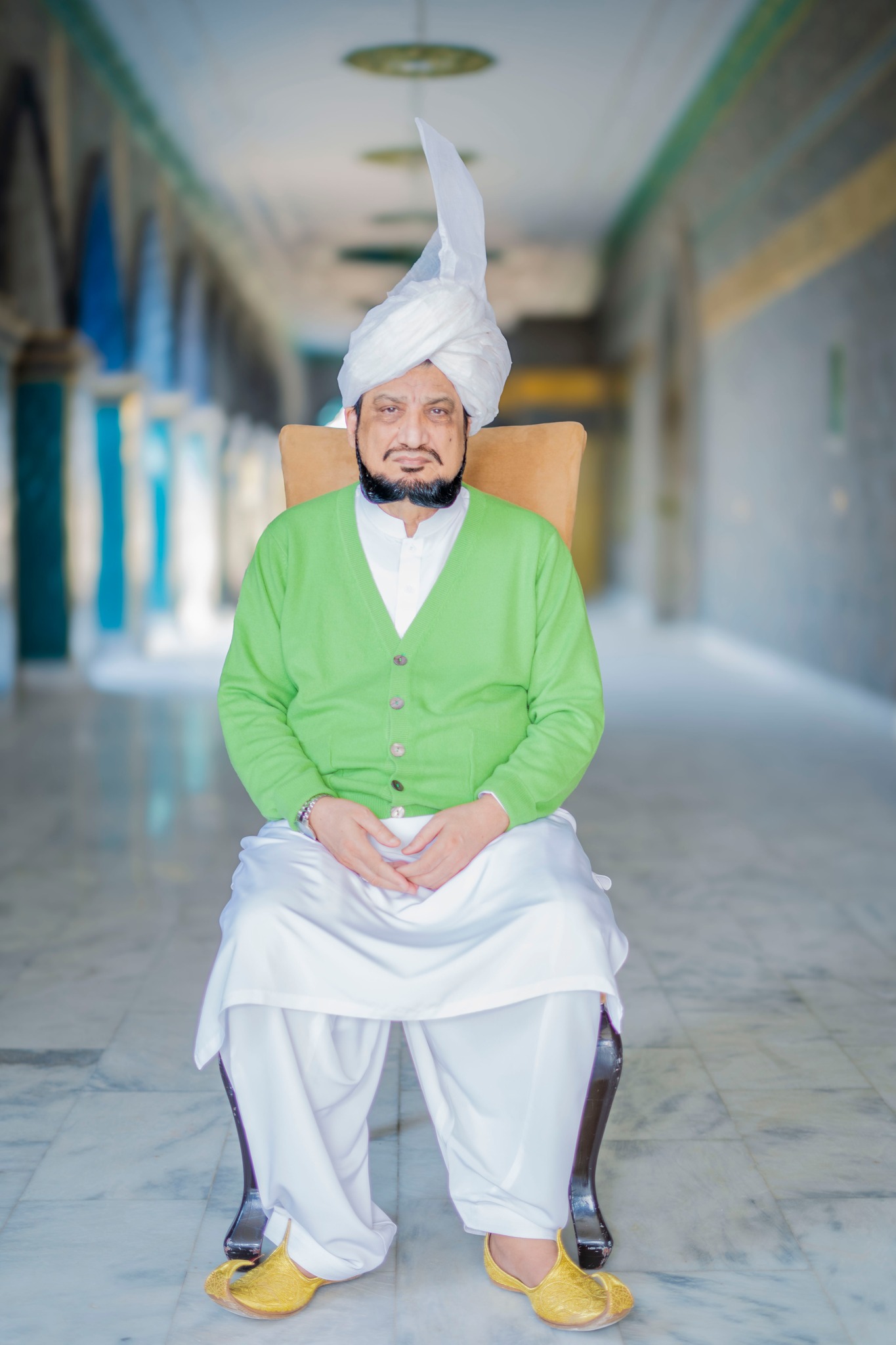
Sultan-ul-ashiqeen writes,
“The world can attest; they did not fight on their own will. They were tricked and pushed into the flames of war through betrayal and deception.”
(The Rashidun Caliphate)
Additionally, Zubair and Talha traveled to Makkah, where they met Aisha and briefed her about the circumstances in Madina.
Before that, Aisha had intended to travel to Madina, but she decided against it after learning about the situation there.
Aisha gave a speech on this occasion.
“Swear to God! Usman was killed innocently; I will avenge his blood.”
(Tareekh-e-Ibn Khaldun, Part I, Volume II, p. 382)
Ibn Kathir writes,
“In her sermon, Aisha called on the populace to rise and demand Usman’s blood. She also emphasized the ruling she had rendered against the individuals who had killed Usman in the holy city and month. They shed people’s blood and looted their property without even considering the honor of the Prophet’s city. It was a theft of their property. As a result, the populace embraced her statements, was willing to follow her in the work in which she saw expediency, and promised to follow her wherever she went.”
(Tareekh-e-Ibn Kathir, Part VII, Volume IV, p. 231)
Departure for Basrah
The next concern was where to go when everyone was ready. Divergent viewpoints were expressed. Some advised going to Madina, but others countered that since the rebels already control the area and we are a small group, it would be best to abandon the intention of Madina; otherwise, our efforts would be in vain, and we would face reprisals as well as not succeed in avenging Usman’s blood. Some suggested that they should travel to Syria, as it would be simpler to exact retribution there with Muawiya’s help. Someone remarked that the Muawiya alone is enough for the rebels and that it would be better to go to Basra and gather more people. More individuals will therefore assemble to exact revenge. We have great hopes of winning in Basra because Ali has a lot of opponents there. Some gave the opinion of going to Syria. Ibn Amir said, “Since Muawiya is in Syria and has the power to put an end to the rioting, let’s go on to Basra, where my argument has been made and the crowd is moving in Talha’s direction.” The attendants said, “This is appropriate because, as much as we have companionship there, they will be unable to repel the onslaught from those in Madina. Since Makkah’s residents have been convinced, we should prepare the people of Basra to avenge Usman when we conquer their country. We will find it easy to combat Usman’s killers at that point.” Everyone was in agreement with this viewpoint. (Tareekh-e-Ibn Khaldun, Part I, Volume II, p. 382)
Tabari writes,
After all the suggestions were considered and the journey was the only option left, a number of people questioned how they could travel because they had nothing to prepare them for the journey. Yala ibn Umayya said, “I have six hundred thousand dirhams and six hundred camels. You should ride these camels.”
Ibn Amir added,
“You people should get ready; I have so much wealth.”
The announcer then declared that Talha and Aisha were traveling to Basra. Anyone who wants the honor of Islam and wants to fight with these murderers and exact revenge on Usman should be allowed to do so. We have food, a ride, and equipment; the person who lacks any of these things should take it from us.
(Tareekh al-Tabari, Part III, Volume II, p. 49)
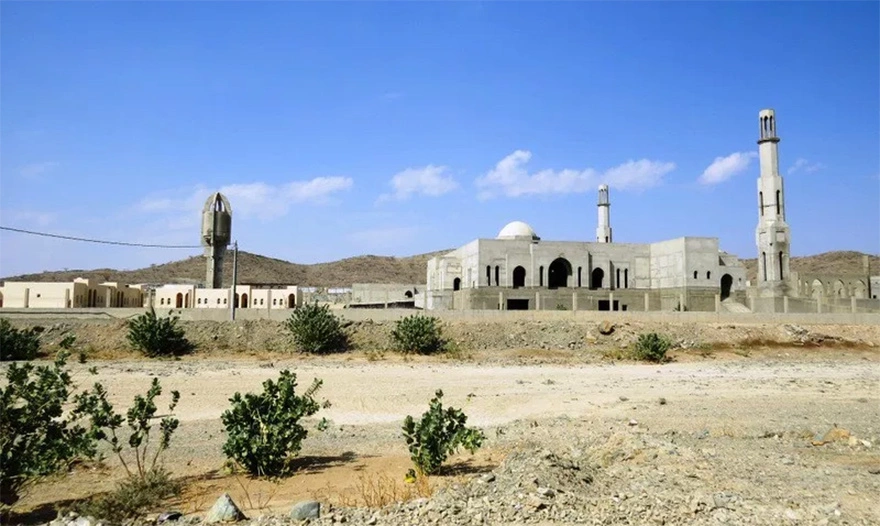
DHAT’ IRQ
During this journey, the rest of the mothers of the believers were separated from Aisha.
Ibn Khaldun writes,
“Other Mothers of the Believers came with Aisha to Dhat’ Irq and left that place crying.”
(History of Ibn Khaldun, Part I, Vol. II, p. 383)
Sultan-ul-ashiqeen writes,
When Aisha left Makkah, the other mother of the believers traveled with her till Dhat’ Irq, and from there, she said goodbye to her in tears.
(The Rashidun Caliphate)
This caravan came upon a spring while traveling. This is a crucial occurrence because it essentially decides which of the two parties is closer to the truth. Every historian has described it, although they all do it in different ways.

Tabari writes,
A person says, ”I was riding a camel when a rider came in front of me and asked me, O camel owner, do you want to sell your camel?”
Person: Yes!
Rider: What does it cost?
Person: One thousand dirhams.
Rider: Rider: Are you crazy? Who sells a camel for a thousand dirhams?
Person: Yes, this camel of mine is a special camel.
Rider: What is so good about it?
Person: Every time I rode on it and pursued someone, I was able to catch him, but I was never caught. Additionally, the pursuer was never able to catch up to me when I was riding it.
Rider: Do you also know for whom we want to buy this camel? If you know this, you should never ask for such a price.
Person: Who do you want to buy this camel for?
Rider: For your mother.
Person: I arrived alone, leaving my mother at home. She did not intend to travel.
Rider: (no, but) for the mother of the believers, Aisha.
Person: Then you can take this camel; it has no price now.
Rider: I will not take it for nothing. You accompany me to our lodging, and I will give you some dirhams and she-camels for riding.
The person’s statement is that, “When I went with this rider, they gave me she-camel for riding and gave me four hundred or six hundred dirhams.”
After that, the rider asked me, “O Person, do you know the way?”
Person: Yes, I am one of those people who can find others.
Rider: So you come with us.
The person’s statement is that, “When I was with them, They would ask me the name of the valley and spring that we had traveled through. When we came to the hawab spring while we were walking, the dogs began to bark at us. Some questioned me about this spring.”
Person: This spring is Hawab.
A person says that upon hearing my answer, Aisha screamed loudly, hit the arm of her camel with a whip, and then said,
By God, I am the one about whom the Holy Prophet predicted that she would make the dogs of Hawab bark. O people! Take me back. (Tareekh-e-Tabari, Volume III, Part II, pp. 58–57)

Ibn Khaldun writes,
Gradually, they reached the spring of Hawab, and then the dogs started barking. When I inquired, it came to light that this spring is hawab. Aisha heard it and said, “Take me back! Return!”
The Holy Prophet once said while his wife was sitting next to him, “I wish I knew which of you would make the dogs of Hawab bark.” The camel sat down as she placed her hand on its neck.
(Tareekh-e-Ibn Khaldun, Volume II, Part I, p. 383)
Hadiths and history books inform us that Aisha yearned to return, but her wish was denied.
It is narrated from Qays that when Aisha (on her way from Madina to Basra) reached the waters of Banu Amir, the dogs started barking. She asked, “Which place is this?” The people replied, “This is the place of Hawab’s water.” She said, “My idea is to go back.” But some of his fellow travelers said, “Proceed without hesitation; there’s a chance that Muslims will see you, and Allah will mediate a settlement between them.” She said, “The Holy Prophet said to us that, “When the dogs of Hawab start barking at one of you, what will be the condition of that person?” (Ahmad 24758)
When Aisha came to the place of hawab, she heard the barking of the dogs and said, “I think that I should go back because the Holy Prophet said to us, Who among you is the one who will make the dogs of hawab bark?”
(Al-Salsala Sahiha 3544).
Al-Albani writes this hadith in his narration:
Ibn Abbas narrates that the Holy Prophet said to his wives, “I wish I knew who among you would ride a camel with a lot of facial hair; when she gets off the camel, the dogs of Hawab will growl at her; a large number of people will be killed on her right and left, but she will manage to survive.”
Al-Albani writes,
The summary statement is that the chain of this hadith is correct and there is no problem in its text.
It is narrated from Tawus that the Holy Prophet said to his wives, “Which amoung you will make the dogs of Hawab bark?” (Kanz Umal, 31580)
It is narrated from Aisha that the Holy Prophet said to his wives, “Which amoung you will make the dogs of Hawab bark?” Dogs barked at Aisha at night when she went near some of Bani Amir’s springs. When Aisha asked about this place, she was informed that it was the spring of Hawab. She made a stop there and said that I think I should go back because I heard from the Holy Prophet that, “What will be the condition of that one person to whom the dogs of Hawab will bark?” People told her, “O mother of believers, you are going for peace between people.” (Kanz al-Umal, 31567)
Ibn Kathir writes,
During the journey of battle of camel, Aisha reached the population of Bani Amir at night and the dogs there started to bark. She asked, “which place is this?” It turned out that place was “Hawab” (so she remembered the prophecy of the Holy Prophet, Which amoung you will make the dogs of Hawab bark?) so when she intended to go back, your fellow travelers said, “No, do not go back, come with us.”
(Tareekh-Ibn-Kathir, Vol. 3, Part VI, p. 514)
Thus Aisha was taken against her will.

The Hypocrites Started the War
When the army reached near Basra, the governor of Basra Usman ibn Hanif sent two envoys to Ayesha bint Abi Bakr to ask her the reason of her arrival. They were told that the army was on the mission to take retribution from the murderers of Usman ibn Affan. The governor was also urged to join but he replied that he wanted to wait for Ali ibn Abi Talib. Meanwhile, both the armies confronted each other. Taking advantage of the situation, the hypocrites attacked the army of Ayesha before Ali’s arrival. In fact, there were hypocrites in both the armies. Hakim ibn Jabla, the first person to affront Usman, was in the army of Basra. He attacked the army of Ayesha.
Ibn al-Kathir writes:
The people in Ayesha’s army tried to stop themselves from killing the people in other army but Hakim ibn Jabla attacked them furiously.
(Tarikh Ibn Kathir, Vol. IV, section VII, p. 332)
However, Ayesha forbade her army to counterattack to avoid war. In this way, night fell and the war did not start. Next day, early in the morning Hakim ibn Jabla again attacked. As a result, numerous people from the army of Basra were killed. In the night, the house of governor of Basra was raided and the attackers pulled out the hair of his beard.
Ibn Kathir writes:
People forcefully entered the house of Usman ibn Hanif, took him to Talha and Zubayr and pulled out his hair. Talha and Zubayr reported this extremely unpleasant incident to Ayesha. She ordered to release the governor.
Ali ibn Abi Talib knew that hypocrites were hidden in both the groups. Hence, when he set for Basra, he said:
Be aware! I am setting out tomorrow. Get ready for the journey. Nevertheless, the person who helped even a bit in the murder of Usman cannot join us.
(Tarikh Ibn Kathir, Vol. IV, section VII, p. 238)
Ibn Khaldun states that the people who initiated the Battle of Camel were actually the hypocrites who were among the murderers of Usman. He writes:
People from both (Ali and Ayesha’s) armies had good ties and they only wanted reconciliation. Hakim and Malik from Ali’s army went to Talhah ibn Ubaydullah and Az-Zubayr ibn al-Awam and returned with the reassurance that they will continue to abide by the agreement which al-Qa’qa ibn Amr al-Tamimi left them with. Then, in the evening Ibn Abbas met Talhah and Zubayr while Mohammad ibn Talhah met Ali to negotiate upon the terms of reconciliation. They agreed upon the terms and decided to write down the agreement the next morning.
This proceeding worried the rebels who had assaulted Usman ibn Affan. They connived for the entire night how to start the war as soon as the sun rises and obstruct the path of appeasement. Thus, early in the morning the rioters carried out their plan and created a false scene of fight. Both the armies had no clue of what happened. Rioters from Egypt attacked the Egyptians, insurgents of Rabia tribe attacked their tribe, rebels from Yemen attacked Yemenis and those from Basra attacked their people. In short, rioters from every tribe attacked people of their own tribe who were in both armies. When Talhah and Zubayr heard the noise of war, they immediately appointed Abdul Rahman ibn Hars on right side, Abdul Rahman ibn Attab on left side of the battlefield and themselves held positions in the centre. When their people asked the reason of all that noise and starting the fight after reconciliation, it was told that people of Kufa started shooting arrows just on sunrise. Talhah and Zubayr exclaimed, “Alas! Ali is adamant to shed blood” and fought back the attackers. Similarly, Ali came out of his camp on hearing the noise and asked the reason. The rioters from Saba’iyya group had already appointed a person who answered that they were sleeping peacefully when people of Basra attacked suddenly.
(Ibn Khaldun Vol. II, part one, p. 396)
Sultan-ul-Ashiqeen Sultan Mohammad Najib-ur-Rahman writes:
Both parties had already reconciled, they had agreed on the formula of “first unity and reformation then retribution.” However, the evildoers and the enemies of Islam never wanted harmony among the Muslims.
(The Rashidun Caliphate)
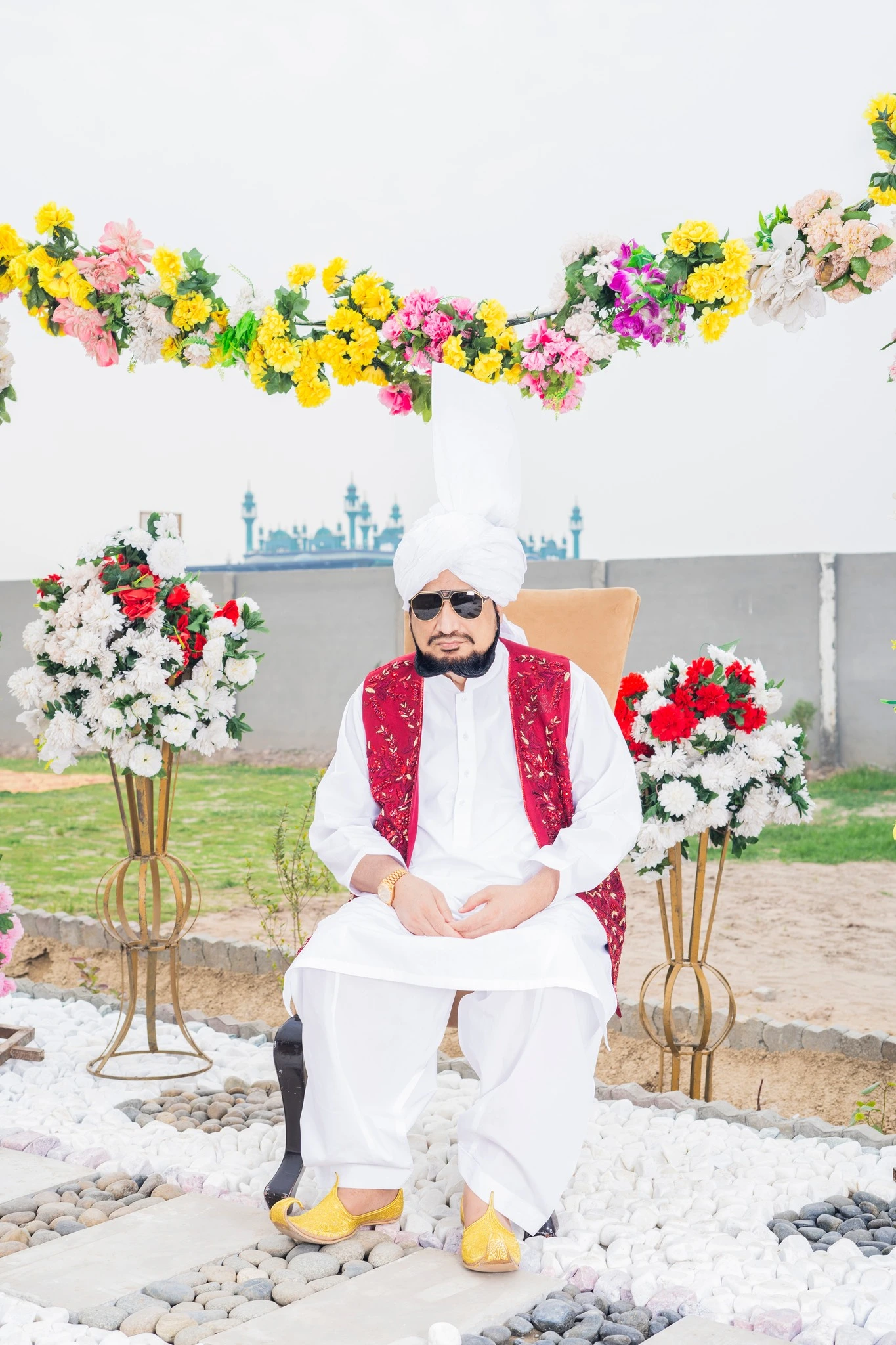
He further states:
The followers of Abdullah ibn Saba and the murderers of Usman put their heads together in the darkness of night and concluded that reconciliation between Ali and Aisha would make their lives miserable. In that case they would be severely punished and beheaded for sure. How could they bear this! Thus, in order to protect themselves, they wove a web to trap the believers which resulted in the loss of thousands of Muslim lives.
After being exhausted for months, both parties were sound asleep in the joy of reconciliation when the rebellious insurgents attacked both sides simultaneously. Disrupted from sleep, they got up and haphazardly held their swords and were forced into killing each other. The army of Aisha thought that Ali had breached the settlement and vice versa. When Talhah and Zubayr heard the screams and saw the storm of arrows, they inquired the reason and were told that the people of Kufa had attacked without waiting for the morning.
(The Rashidun Caliphate)
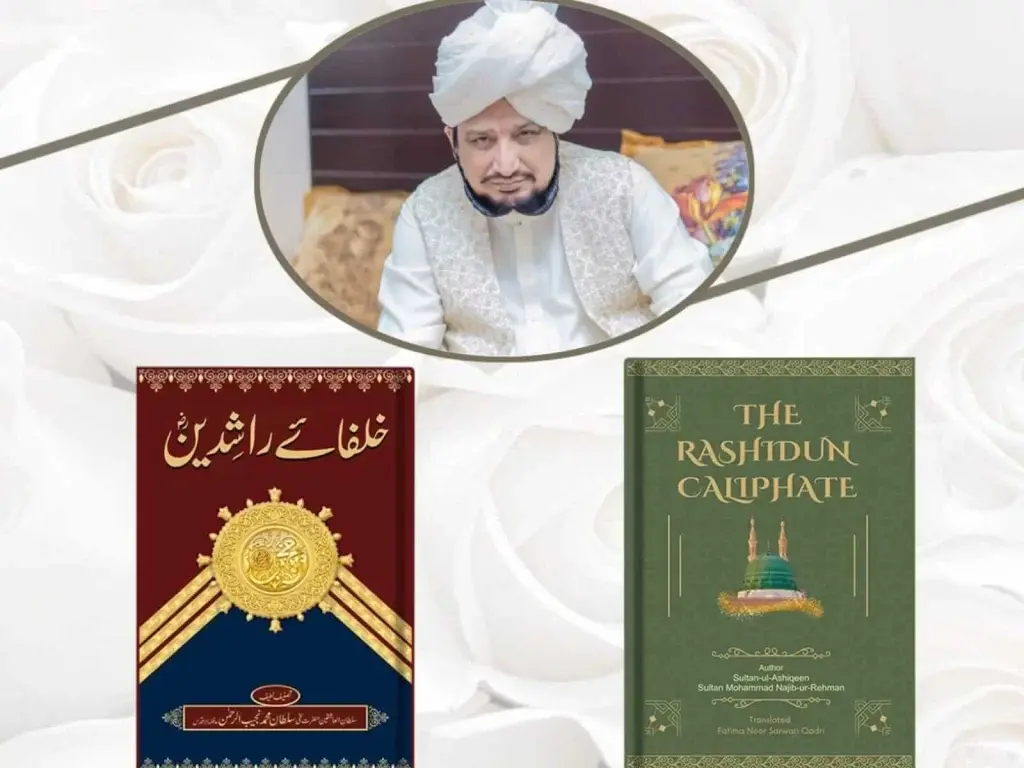
Ali Ibn Abi Talib and Ayesha Bint Abi Bakr Wanted Peace
The reality is that neither Ali nor Ayesha was in the favour of war. Rather, they both wanted peace.
Ibn Kathir writes:
When Ali intended to set from Rabadha, Ibn Abi Rafayya bin Raffay stood up and asked, “O Caliph! Where are you taking us and what do you intend to do?” Ali answered, “We want nothing but reconciliation if they accept it.” Abi Rafayya said, “What if they do not accept?” Ali replied, “Then we will not confront them despite their breach of promise. Moreover, will give them their right and observe patience regarding our right.” Abi Rafayya further asked, “If they will not accept this as well then what?” Ali said, “We will not fight them till they fight us.” Abi Rafayya said, “If they do?” Ali said. “Even then we will try to avoid fight.” Ibn Rafayya said, “This is the right thing to do.”
(Tarikh Ibn Kathir, Vol. IV, section VII, p. 235)
A similar incident is narrated in almost all books on Islamic history which clearly indicates that none from Ali, Ayesha, Talhah and Zubayr wanted war. Ibn Khaldun writes that Ali ibn Abi Talib said, “O people of Kufa! I have called you to come with us to talk with our brothers. If they reconsider their plan, it would be good. If they insist on it, we will show softness.”
(Ibn Khaldun Vol. II, part one, p. 392)
When Ayesha bint Abi Bakr reached the suburbs of Basra, the governor of Basra sent Imran ibn Husain and Abu al-Aswad to her as envoys. When they asked Ayesha the reason of her arrival, she replied as quoted by Tabri, “We have set out for the sake of reformation and betterment that Allah and His Prophet have ordered to every man and woman, minor and adult. We have come to invite people towards righteousness.”
(Tareekh-e-Tabri Vol. III, part II, p. 65)
So much so, when Hakim ibn Jabla attacked Ayesha’s army near Basra before the battle of Camel started, she took her army aside just to avoid war among the Muslims.
Tabri writes:
Ayesha bint Abi Bakr ordered her people to move towards the right side. Her intention was to avoid the war.
(Tareekh-e-Tabri Vol. III, part II, p. 70)
The hypocrites were afraid that Ali, Ayesha, Talhah and Zubayr might reconcile as this would lead to their destruction. Ibn Kathir writes that one of the hypocrites said, “We know what Talhah and Zubayr think about us but we are utterly unaware of Ali’s opinion. If they make peace with each other, it would only the bring our death. If this happens, we will treat Ali the same way we did with Usman. People will either remain silent or will agree with us.”
(Tarikh Ibn Kathir, Vol. IV, section VII, p. 339)
It is also a fact that Ayesha bint Abi Bakr considered that only Ali ibn Abi Talib deserved the caliphate Tabri writes:
Ahnaf ibn Qays says, “I went to Makkah. While I was still there, I got the news of Usman’s martyrdom. The mother of believers, Ayesha was also in Makkah. I visited her and asked whom should I pledge allegiance? She advised me to pledge allegiance to Ali ibn Abi Talib.”
(Tareekh-e-Tabri Vol. III, part II, p. 113)
Ali. Ahnaf says that he went to Talhah and Zubayr and expressed his fear that Usman might be killed. Then he asked them for advice that whom he should pledge allegiance in that case. They both were in the favour of Ali.
Ahnaf said, “Do both of you really agree upon the caliphate of Ali ibn Abi Talib and order me to pledge allegiance to him?” Talhah and Zubayr answered in yes.
(Tareekh-e-Tabri Vol. III, part II, p. 113)

Why Zubayr did not Participate in the Battle of Camel
Abdus-Salam relates from a person that on the day of Battle of Camel Ali talked to Zubayr in solitude and asked, “O Zubayr! I ask you in the name of Allah, do you remember the day when we were in Saqifah of Saida and you had held my hand, the Holy Prophet said to you, ‘Indeed! You will fight against Ali though you will be the wrong one. Then he will be helped against you’.” Zubayr said, “Yes! I have recalled these words of the Prophet of Allah! Now I will not fight with you.”
(Kanz al-Ammal 31689)
Qitadah relates that when Zubayr left the battlefield on the day of Battle of Camel and Ali ibn Abi Talib was informed about it, he said, “If Zubayr considered himself right, he would never have left.” This happened because once Prophet Mohammad met Ali and Zubayr in Saqifa of Saida and asked Zubayr, “Do you love Ali?” He answered, “Why would I not love him?” The Prophet said, “What would be the situation when you will fight against him even though you will be the wrong one.” Qitada adds that he considered that the reason of Zubayr’s not participating in the battle was only that he remembered the Prophet’s words.
(Kanz al-Ammal 31650, Dalail al- Nubuwwah by Imam Bayhaqi)
Abdus-Salam relates that Ali met Zubayr separately on the day of Battle of Camel and said, “I ask you in the name of Allah, don’t you remember the Prophet said to you that you will fight against me and you will be the cruel one, then I will be helped against you. It was the day when we were in the courtyard of so and so tribe and you were holding my hand.” Zubayr said, “Yes, I do remember. Now I will not fight with you.”
(Musannaf of ibn Abi Shaybah 38968)
When Zubayr returned disheartened from the Battle of Camel, a person from the tribe of Tamim named Ibn Jarmuz martyred him.
(Mustadrak 5567)
Ali ibn Abi Talib asked Zubayr, “Do you remember the day when the Holy Prophet said to you, ‘Indeed! You will rise up in a fight against a man with whom you will have done wrong’.” Zubayr replied, “Yes I have recalled. Had you reminded me of it before I set out, I would never have revolted against you. By God! Now I will not fight with you.” After this conversation they separated from each other. Ali ibn Abi Talib went to his army and said to his supporters, “Now Zubayr will not fight us.”
(Ibn Khaldun Vol. II, part one, p. 395)
Tabri writes:
Zubayr backed off from the war and left for Safwan.
(Tareekh-e-Tabri Vol. III, part II, p. 115)
All these references prove that Az-Zubayr ibn al-Awam did not participate in the Battle of Camel. Certainly, he understood that confrontation of Muslims towards each other was due to the conspiracy of hypocrites.
Martyrdom of AZ-Zubayr Ibn Al-Awam
Mus’ab ibn Abdullah Zubayri writes:
Zubayr left for Madina. Amr ibn Jarmuz followed him. When they reached the valley of Siba he martyred Zubayr deviously. Allah saved Ali ibn Abi Talib and his companions from killing Zubayr. Amr ibn Jarmuz martyred him in the month of Rajab, 36 AH. It is famous in Arab about the tribe of Mujasha that they hid many truths regarding Zubayr. That is why, Jarir writes, “After the martyrdom of Zubayr, the people of Mujasha wore blood-stained clothes that were not washed.”
(Mustadrak 5549)
Tabri narrates the incident of Zubayr’s martyrdom in these words:
Zubayr separated himself from the war and went to Safwan. This place is at the same distance from Basra as is Qadisia. On the way, he met a person named Na’ar from the Mujasha tribe. He said, “O Companion of the Prophet! Where are you going. Please come with me, I will give you refuge and no one will dare harm you.” Zubayr accepted that person’s offer and went to Ahnaf with him. Ahnaf asked Zubayr, “Now what do you want me to do?” Zubayr replied, “Muslims are cutting each other with their swords. The foremost thing required is unity among them.” Then Zubayr went with Na’ar to his home.
Amr ibn Jarmuz, Fudhala ibn Habis and Nufee were also listening this conversation. They chased Zubayr and Na’ar. Zubayr was riding a weak horse, Amr ibn Jarmuz attacked him from the back but missed it. Zubayr counter-attacked him. His attack was so severe that Amr was assured of his death. He called out Fudhala and Nufee. They came to help and the three martyred Zubayr.
(Tareekh-e-Tabri Vol. III, part II, p. 115)
Talhah Ibn Ubaydullah did not participate in the Battle of Camel
Rafaya ibn Ayyas Zibbi relates from his father and he relates from his grandfather, “On the day of Battle of Camel we were with Ali ibn Abi Talib. Ali called Talhah ibn Ubaydullah to meet him. When Talhah came Ali asked him, “I ask you in the name of Allah, did you hear the Holy Prophet when he said, ‘To whoever I am the master, Ali is his master as well. O Allah! Help him who helps Ali and be the enemy of his enemy’.” Talhah affirmed it. Ali said, “Then why are you at war against me?” Talhah replied, “I forgot.” Then Talhah returned.
(Mustadrak 5594)
Ibn Kathir also states that Talhah ibn Ubaydullah did not fight the Battle of Camel. He writes:
When Talhah met Ali during the Battle of Camel, Ali exhorted him and he stayed aside.
(Tarikh Ibn Kathir, Vol. IV, section VII, p. 247)

Marwan ibn al-Hakam Martyred Talha ibn Ubaydullah
Qays ibn Hizam says,
During the Battle of Camel, I witnessed Marwan ibn al-Hakam throw an arrow at Talha ibn Ubaydullah that struck his knee. Despite the pain, he continued to recite the Tasbih until he was martyred.
(Mustadarak 5591)
Sa’d ibn Mu’adh says,
On the day of the Battle of Camel, I walked by Talha as he was taking his final breath. As I approached him and stood there, he remarked, “I see the face of this man like the moon of the fourteenth night. Which group do you belong to?” I stated, “I am one of the companions of Ali ibn Abi Talib (RA).” He said, “Extend your hand, I pledge allegiance to you.” As I extended my hand and he pledge allegiance, he passed away. I went to Ali and told him about Talha. Ali said, “Allah is great, Allah is great, the holy prophet (pbuh) said truth, Allah prevented Talha from ascending to heaven without my pledge of allegiance.” (Mustadarak 5601)
Ali’s Perspective about the People in the Battle of Camel
It is narrated from Abu Al-Bakhtari that Ali was asked, “What do you say about the participants in the Battle of Camel and were they disbelievers?” Ali replied, “No! They stayed away from polytheism.” Then it was said, were they hypocrites? Ali replied, “No! Hypocrites do not remember Allah even a little bit.” It was then asked who were they? Ali said, “They was our brothers who rebelled against us. (Ibn Abi Shaiba 38918)
Abd Khair says,
Ali was asked about people in Battle of Camel, he said, “The people who rebelled against us were our brothers. They have returned and we accepted them.” (Sunan al-Kubri of Al-Bayhaqi 16752)
Ibn Khaldun writes,
In their various armies, Ali, Talha and Zubayr preached that one should not pursue those who leave the battle, fight with them, attack any wounded individuals or seize any property. (Tarikh Ibn Khaldun, Volume 2, Part 1, p. 396)
Shah Waliullah writes,
Aisha, Talha and Zubayr were disabled on the basis of the principle that whoever did innovation and committed a mistake deserves a reward, so they were (disabled) to the extent that they reasoned from doubt even though there was another more convincing argument.
(Azalah al-Khafa, Vol. IV, p. 520)

Ali (RA) and Quran are Inseparable
Abu Thabit, the freed slave of Abu Dharr, says, I was with Ali at the Battle of Camel. I had the same false intuition in my mind that other people had about Aisha bint Abu Bakr. However, Allah took away that false intuition from me during the Zuhr prayer. Therefore, I battled alongside Ali (RA). After the battle, I arrived in Madina and then went to Umm Salama. I said, “By God! I am the freed slave of Abu Dharr, I have not come to ask for food or water. She greeted me warmly.” I related my story to her and she replied, “How did you survive that false intuition? I replied, “I was also in that condition but at the time of zuhr prayer, Allah gave me the power to fight these thoughts.” She said, “You have done well. I heard the Holy Prophet saying that the Quran will always be with Ali and Ali will always be with the Quran. They will never be apart until they meet me in Hawd al-Kawther. (Mustadarak 4628)
Prediction of Battle of Camel
It is narrated from Abdullah ibn Abbas in Tabarani that the army of Ali was alarmed and terrified to learn that the people of Basra had assembled for battle under Talha’s leadership. Then Ali said, “By Allah! The people of Basra will be defeated, Talha and Zubayr will be martyred and 6550 or 5500 people (the narrator is unsure of this) will come for your help from kufa.”
According to Ibn Abbas, when they arrived in Kufa, he thought, “Now it will be known if the above-mentioned number of people would come from Kufa for our help,” because he had a doubt after hearing this. He thought, if Ali had not heard this from the Holy Prophet, then this was purely a war trick. Ibn Abbas says that he asked a soldier how many people had come from Kufa, he mentioned the same number that Ali had mentioned.” (Tarikh Ibn katheer, Vol. 3, p. 515)
Uqba ibn Amir narrates,
Abu Ayyub narrated this hadith to me during the caliphate of Umar that the Holy prophet had ordered Ali to wage war against those who broke allegiance in Battle of Camel, rebels and heretics.
(Mustadarak 4674)
There was no Enmity Between Ali (RA) and Aisha (RA)
In order to demonstrate that Aisha and Ali had no malice towards one another and that they were both free of these misconduct, a few facts must be stated. Actually, the primary causes of this war were the hypocrites and Abd Allah ibn Saba and his companions.
Ali and Aisha would never have behaved this way towards one another if they had been at odds. Rather than calling one another wrong, both of them were fully aware of each other’s status.
After the Battle of the Camel ended, Ali made arrangements for Aisha to stay and get some rest. Aisha was humiliated by some seditionists who seemed to be posing as members of Ali’s army.
Ibn Khaldoun writes,
After learning that some individuals and rebels had spoken harshly and cruelly about Aisha, Ali arrested and punished several of them.
(Tareekh-e-Ibn Khaldun, Vol. 2, Part 1, p. 400)
Ibn Kathir writes,
A man informed Ali that two men at the door were speaking ill of Aisha. Ali ordered Al-Qaqa ibn Amr to give them both a hundred lashes.
(Tareekh-e-Ibn Kathir, Vol. 4, Part 7, p. 246)
Aisha addressed the populace following the Battle of Camel and said,
O my sons! Avoid placing blame and insulting one another. By Allah, the relationship between Ali and I has always been the same as that of a woman and her brother-in-law. In spite of my dislike, he is the greatest man. (Tarikh Ibn Kathir, Volume 4, Part 7, p. 246)

Ali’s (RA) Respect for Aisha (RA)
Similarly, Ali said to the people,
O people! Aisha is the wife of the Holy Prophet in this world as well as in the hereafter. (Tarikh Ibn Katheer, Vol. 4, Part 7, p. 246)
When Aisha’s camel collapsed as she was riding it during the war. Ali departed the conflict and went straight to Aisha. He asked what condition she was in.
Ibn Kathir writes,
Ali came to greet Aisha and asked, “Oh my mother! How are you?” She replied, “I am fine.”
(Tarikh Ibn Kathir, vol. 4, part 7, p 244)
Ali led the funeral prayers of the deceased of both sides.
Ibn Khaldun writes,
Ali collected the deceased of both sides and offered funeral prayers and buried them. All of the wealth and resources in the cantonment were gathered and brought to the Jama Masjid. It was declared that anyone wishing to claim their wealth and resources might do so, however, the weapons will remain in Bait Al-Mal.
(Tareekh-e-Ibn Khaldoun, Vol. 2, Part 1, pp. 400-399)
In this way, Aisha also expressed sympathy for the martyrs who were martyred in the army of Ali.
Ibn Kathir writes,
Aisha inquired about those people who were martyred in her army and Ali’s army. Whenever one of them was mentioned, she would pray for their forgiveness.
(Tarikh Ibn Kathir, Vol. 4, Part 7, p. 246)
Ali (RA) Bid Farewell to Aisha (RA) with Great Respect from Basra
Likewise, when Aisha started to leave Basra, Ali sent her away with great honour and dignity.
Ibn Kathir writes:
When Aisha decided to leave Basra, Ali provided her as many riders and provisions as she would require. Any remaining companions were then sent back to Aisha. Aside from individuals who would rather remain in Basra themselves. He chose forty well-known and virtuous women of Basra to accompany Aisha and sent her brother Muhammad ibn Abi Bakr with her. When the day of the coach arrived, Ali stood at the door and others also came to see him off. Aisha came out of the house in her hood and bid farewell to the people and prayed for them. (Tarikh Ibn Kathir, Part VII, Volume 4, p. 246)
Ibn Khaldun writes,
On Rajab 32 AH, Ali packed the travel equipment and sent Aisha along with forty women and Muhammad ibn Abi Bakr from Basra. Hasan ibn Ali followed them with a distance of a day. (Tareekh-e-Ibn Khaldun, Part I, Vol 2, p 400)
According to Ammar ibn Yasir, our mother Aisha did, in fact, make this voyage (the Battle of Camel) and by God, she is the wife of the Holy Prophet (pbuh) both here on earth and in the hereafter. However, Allah tested us to determine whether we would obey her or Allah. (Azalat al-Khafa, Vol. IV, p. 523)

Battle of Camel and Division in Muslim Umma
It is also a fact that the Battle of Camel produced a great deal of division among Muslims. There was division among nearly every tribe from Makkah to Basra. The umma was split into those who supported Aisha, those who support Ali and those who chose to remain neutral. In addition, Aisha sent letters urging people in every location to assist them, thus those tribes were also divided.
Despite the lack of mass media in the era, it is said that majority of Muslims became aware of the Battle of Camel on that day. Ibn Kathir writes,
The people who lived in the region between Makkah, Madinah, and Basra are said to have learned about this event on the day of the war, when vultures and eagles were seen soaring with human hands and feet, among other human organs. Before the sun set on the day of the war, some of them used to fall on these roads until Madina people learned about this historic occasion. It appeared as though a vulture carrying something stumbled over these people. As soon as anyone noticed it, it was a palm with a ring on it that had the inscription Abdul-Rahman ibn Attab ibn Asid. (Tarikh Ibn Kathir, Volume 4, Part VII, p. 246)
ALLEGIANCE TO THE CALIPHATE
After the caliphate, Ali wrote letters to Muawiya asking him to pledge allegiance, however he did not respond.
Ibn Khaldun writes,
Muawiya also received a second letter from Sabra al-Juhanni at the same time. Following Usman’s martyrdom, Muawiya remained silent for three months before writing Qubaysa Abbasi a letter headed “From Muawiya to Ali”. Aside from that, he sent some verbal message to Madina along with the messenger. Sabra and Qubaysa entered Madina in Rabi al-Awwal 36 AH. Qubaysa dispatched a letter just as Muawiya had instructed. The seal was broken, the envelope was opened and there was nothing written in it except the title letter.
(Tareekh-e-Ibn Khaldun, Volume 2, Part I, p. 380)
Tabari writes,
Sabra al-Juhanni was sent by Ali to Muawiya as a messenger. He approached him and handed him Ali’s letter. However, Muawiya sent the messenger back after few days without responding. Muawiya refused to respond when the messenger requested him to compose a response, but would start reciting these verses, “You can either invite me to a dreadful fight that will age the young and child old, or stand motionless like a fortress. There will be so much carnage among your neighbours and boys that the hair on your head and cap will turn white. There won’t be any other rulers but us, and both the master and the slave will be humiliated.” Therefore, whenever Sabra al-Juhanni read out a letter or demanded an answer, Muawiya used to recite these verses. (Al-Tabari, Vol. 3, Part II, p. 93)
Ali wrote many letters to Muawiya but he did not reply. (Tareekh-e-Ibn Kathir, Volume IV, Part VII, p. 330)
Sultan-ul-Ashiqeen Sultan Mohammad Najib-ur-Rehman View
When Ali wrote a letter to Muawiya inviting him to pledge allegiance to him, he in turn sent him a blank letter. (The Rashidun Caliphate, page 206)
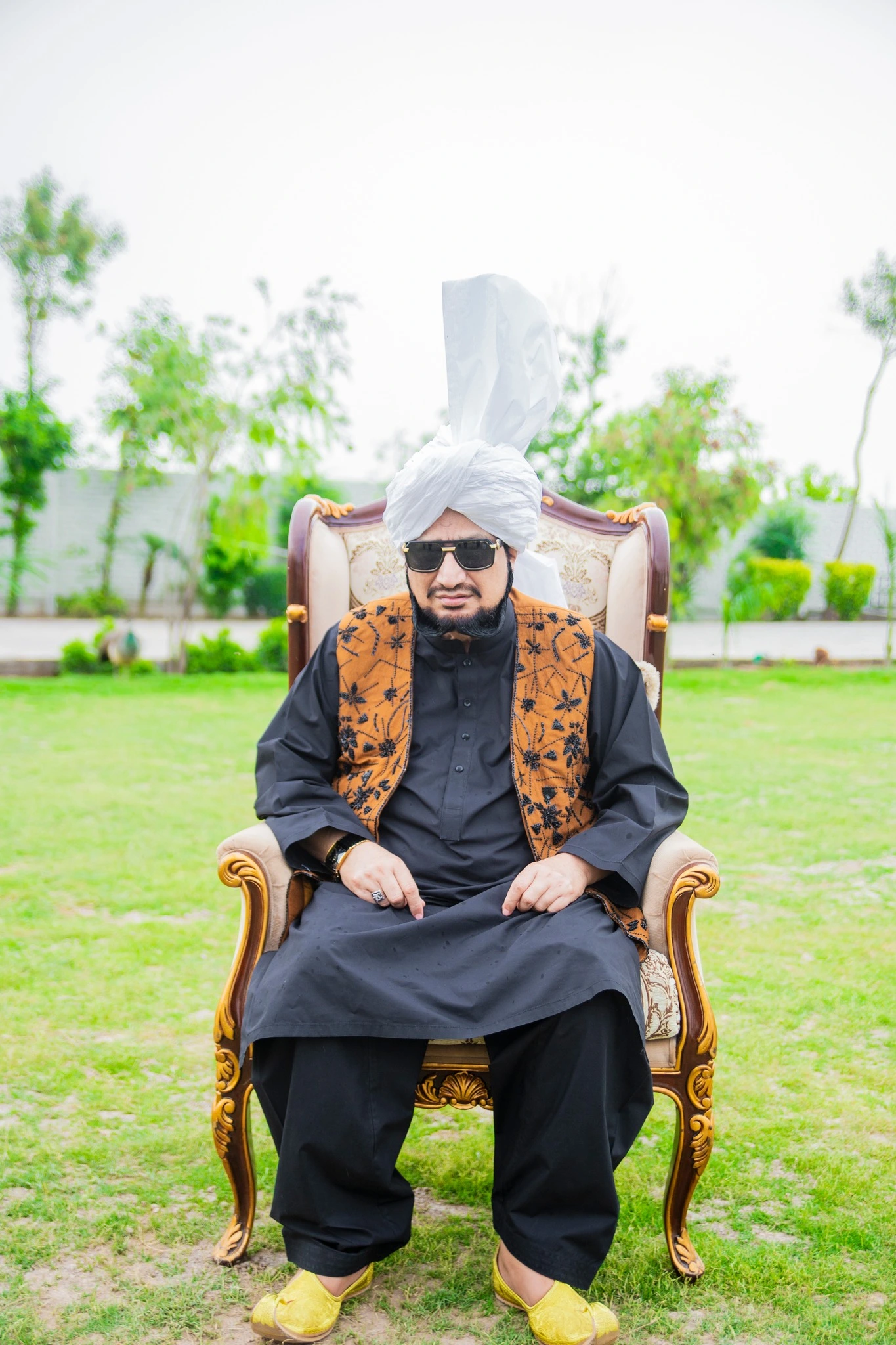
Tabari writes,
Muawiya invited a person from the Banu Abbas tribe and also summoned a man from the Banu Rawaha tribe named Qubaysah. He entrusted him with a document titled “Response from Muawiya to Ali.” It was sealed. Upon handing over the document to Qubaysah, Muawiya instructed him that when he reached Madina, he should open the lower portion of the paper. Then he taught him some things to say to the people of Madina. When Muawiya’s messenger arrived in Madina, the messenger opened the papers as Muawiya had instructed. People began to read the papers and started going to their homes, realising that Muawiya was objecting to the caliphate. The messenger continued forward and reached Ali (RA), handing him the bundle of papers. When they broke the seal, there was nothing written inside. (Tabari, Volume 3, Part Two, Pages 39, 40)
When Ali appointed the mayor of Syria, he was also returned empty handed.
Mayor of Syria
Sahl ibn Hunayf, who was going to be the ruler of Syria, reached Tabuk and encountered some riders. The riders asked who are you? Sahl replied “I am the ruler of Syria”. The riders said, “If you have been sent by someone other than Usman, you should go back.” When Sahl heard this, he returned to Madina. (Tareekh-e-Ibn Khaldun, Vol 2, Part I, p 279-280)
Ibn Abbas had counselled Ali against removing Muawiya since doing so would cause issues for his caliphate. According to Ibn Kathir, Ibn Abbas remarked to Ali,
In particular, Muawiya need to be reinstated in the Emirate of Syria and warned that if you depose him, they would seek retribution for the blood of Usman. (Tareekh-e-Ibn Kathir, Volume 4, Part VII, p. 922)
Maulana Maududi writes,
Muawiya bin Abu Sufyan acted unconstitutionally when he ascended to power as the governor of Syria to avenge for Usman’s (RA) martyrdom. He refused to submit to the authority of the central government. He utilised his power as governor for his personal gain and did not even ask that Ali ibn Abi Talib (RA) should prosecute the killers of Usman and punish them. Instead, he requested that the perpetrators be handed over to him so that he could execute them himself. All this is more like the pre-Islamic tribal chaos than the Islamic era’s organised administration. First of all, Usman’s heirs, not Muawiya, had the right to demand Usman’s blood. If Muawiya was permitted to make this request based on their relationships, it would have been in his individual position rather than as Syria’s governor.
Whatever relationship Usman had with Muawiya, he had no contact with the governorship of Syria. He may personally demand the arrest and trial of criminals by going before the Caliph in his capacity as a prosecutor. As a governor, he had no right to refuse to obey the caliph on whose hands allegiance had been given in a formal constitutional manner, whose caliphate was recognised by the entire kingdom except the province under Muawiya’s administration. By employing the old, illiterate process and the military power of the territory he controlled, against the central authority, he insisted on transferring the murder suspect to the plaintiff for retaliation rather than a trial, allowing him to exact revenge on them directly. (Khilafat o Malokiat, p 125,126)
Shaybah ibn Rabiah said to Muawiya,
We know very well that you also delayed in helping Usman and you wanted him to be killed so that you could gain this position by demanding his blood.
(Tarikh al-Tabari, Volume 3, Part 2, p. 159)
About the efforts made by Ali to avenge Usman, Arman Sarhadi writes,
After pledging allegiance to the caliphate, the most important task before Ali was to find the killers of Usman and take revenge from them. So he did not do any kind of negligence in this regard. He investigated the incidents, but the difficulty was that there was no evidence against any particular individual. Only Naila bint al-Furafisa was present at the time of this tragic event and she was only able to infer that Muhammad bin Abi Bakr had arrived with two men she did not know. Furthermore, according to Naila, Abi Bakr did not take part in the murder.
(Hazrat Syedna Ali Al-Murtaza, p. 71)
Al-Tabari also writes about the efforts of Ali (RA)
After swearing allegiance to Ali, Talha and Zubair came to Ali with other Companions and said, “O Ali! You know that this entire group of rebels took part in Usman’s death, making the blood of Muslims legal. You must exact revenge on them all. However, we made a condition when we pledged allegiance to you that you would enforce what the Sharia dictates.” Ali said: “O my brothers! I am not ignorant of these matters like you. However, what can we do with this nation that has become our master?
Especially when some villagers have also joined the slaves in this murder. Do you have the ability to exact revenge in these circumstances given that you have met them; they are your companions, and they compel you into doing what they want?” The companions said, “No.” Ali replied, “By God! Whatever you are witnessing, I too am witnessing those situations. And I understand that these situations are indeed reminiscent of the times of ignorance (pre-Islamic era), and in this community, the material of ignorance is still found.”
(Tarikh al-Tabari, Volume III, Part II, p. 29–30)
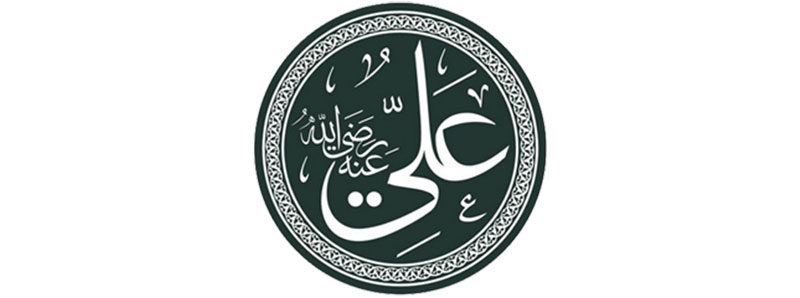
Ali (RA) with the Participants of Battle of Badr
After the Battle of Camel, Ali marched towards Syria. Ibn Kathir writes that Ali was accompanied by Badri Companions,
The army of Ali included 80 Companions who participated in the Battle of Badr and 150 Companions who had the honour of taking Pledge of the Tree.
(Tarikh Ibn Kathir, Volume 4, Part VII, p. 452)
Sultan-ul-Ashiqeen writes
Ali was accompanied by 70 Companions who participated in the Battle of Badr and 700 Companions who had the honour of taking Pledge of the Tree.
(The Rashidun Caliphate, p. 206)
The Incident of a Monk
Ibn Kathir writes
When Ali (RA) reached Riqqa, they stopped at a place called Bulbukh near the Euphrates. There, a monk came out of his cave and approached Ali. He said, “We have a book that has been inherited from our forefathers, and it was written by the companions of Jesus. May I present it to you?” Ali agreed. The monk began to read the book.
Mention of Prophet Mohammad (pbuh) and Ali (RA) in ancient Book
- In the name of Allah, the Most Merciful. Allah did what He had to do and He wrote what was to be written and assured us that He would send a Messenger from among them to teach us the book of wisdom, purify and lead us along the path of Allah. That Messenger will be forgiving instead of irritable, nor rude in speech nor willing to exact revenge on those who wrong him. He shall be the one who at every peak and on every low, will exalt and magnify Allah and his mouth will never stop calling for Takbeer. Allah will give this Messenger the advantage over his enemies. There will be discord in the umma when this Messenger passes away, but it will remain unified for as long as Allah desires.
Then a man from his nation will cross the Euphrates River, he will forbid evil and encourage good, he will make judgements based on truth and not waver in carrying them out. For him, the world will be more repulsive than ashes in other words, more despicable than dust blown in the wind and dying will be more bearable than drinking water. If any of the people of the country find this Messenger, they should believe in him because he will dread Allah in solitude and offer guidance in congregation. He will also not care about who is blameworthy in matters of Allah. He will be rewarded with Allah’s consent and Paradise, whoever finds this pious person and aids him will also be rewarded with martyrdom by dying with him.
The Monk Became Muslim
Then this monk said to Ali that, “I will accompany you and I won’t leave you until I experience the same tragedy that has befallen you.” Ali wept after hearing this and said, “All glory belongs to Allah, who has mentioned me in Abrar’s books and has kept me from forgetting this.”
Then that monk became a Muslim and remained with Ali until he was martyred in the battle of Saffin.
When people went out to find their martyrs, Ali said, “Look for this monk too.” People searched for him and found him dead. Ali offered his funeral prayer, buried him and prayed for his forgiveness.
(Tareekh-e-Ibn Kathir, Volume 4, Part VII, pp. 255-254)
Ali (RA) did not want War
Ali did not believe in war and controversy, his aim was to maintain the unity of the umma which was possible through the pledge of allegiance to the caliphate. Therefore, he tried to avoid fighting as much as possible. He ordered one of his rulers not to initiate the war.
Sultan-ul-Ashiqeen writes
Ali ordered the ruler of the army,
Beware! Do not fight unless they initiate. Do not go after personal issues. Repeatedly invite them towards reconciliation. Neither get too close to them that they might think you intend to fight nor go too far that they perceive it as your cowardness.
(The Rashidun Caliph, p. 206)

Do not start a conflict with the Syrian people as long as they do not and keep calling them to allegiance. If they say no, do not engage in combat with them until they start the conflict, do not approach them in a warlike manner or retreat from them out of fear, instead hold your ground and refuse to back down even if they approach you.
(Tarikh-e-Ibn Kathir, Vol. 4, Part VII, p. 255)
Ali wrote a letter to his army commanders, “Beware! Do not initiate a conflict until you invite these individuals to submit and the reformation efforts are completed.
(Tahrikh Tabari Vol 3, Part II, p. 188)
Ali (RA) Sent Messengers for Reconciliation
Ali sent messengers from his army on several occasions in an attempt to prevent war and preserve unity of the umma but the fighting was still going on.
Abu Mikhnaf narrated from his father on the authority of Abdul Rahman ibn Jandab Al-Azdi that Ali (RA) used to tell us “Do not initiate war until the enemy attacks you first. Thank God, you are on the right, and the fact that the war did not begin from your side is another evidence of your righteousness.”
Ali summoned Sasa ibn Suhan and ordered him to go to Muawiya and tell him,
We have come to fight you, but we do not want to do so without first providing proof. You have sent your horsemen and footmen against us, who started war with us, although we did not want to fight you without providing proof.”
(Tarikh al-Tabari. Vol. 3, Part 2, p 190)
Water of Euphrates River
Muawiya captured the drinking place on Euphrates River and prevented army of Ali from drinking water. Ali sent a message that the water should be opened for both armies. Muawiya agreed but his companions refused.
Sultan-ul-Ashiqeen writes
When Ameer Muawiya agreed to give them access, Walid ibn Uqba and Ibn Abi Sarh opposed and said, “Torment them by keeping them thirsty the way they tormented Usman (RA).”
(The Rashidun Caliphate, Page 207)
Tabari writes
It is narrated by Jundab ibn Abdullah that when we arrived in front of Muawiya’s army, Muawiya had already occupied a spacious and excellent field and had taken possession of the part towards the water supply. To access water from that field, there was only one supply on the river. Muawiya had sent Abu al-Awar to guard this water supply and prevent others from drinking water.
(Tarikh al-Tabari, Volume 3, Part 2, p. 190)
Ibn Kathir writes
Muawiya had taken control of the water supply and landed his army on a wide and flat area. Ali’s army hurried to the water to return with some of it, but the people of Syria prevented them from doing so. (Tarikh-e-Ibn Kathir, Volume 4, Part VII, p. 255)
Fight over Euphrates Water
Ibn Khaldun writes
Ali went to Muawiya and said, “You have seized the Euphrates and stopped the water. People are suffering from thirst. Order your army to not stop us from drinking water until the issue is resolved. Your intention is to abandon the reason we came and engage in combat over the water, with the winner being the one who survives. If they bring the water under their control, we are ready for that too.” Muawiya asked his companions for their opinion. Amr ibn al-As gave the opinion of not taking possession of water. Walid ibn Uqba and Ibn Abi Sarh said that water should be seized and not be given to them, just as these people did not give water to Usman and martyred him in a state of thirst, in the same way these people should be deprived of water.
(Tarikh-e-Ibn Khaldun, Volume 2, Part I, Page 410)
Although Ali thought it was inappropriate to engage in combat in this situation, he nevertheless sent soldiers from his army to search for another location that could contain water. However, no such location was identified. Even so, Ali did not believe it was appropriate to fight and sent a messenger to Muawiya to allow them to use the water.
Tabari writes that Ali sent a message to Muawiya, “Order your soldiers to leave the water supply.”
(Tarikh al-Tabari, Volume 3, Part 2, p. 193)
When Muawiya consented, his companions objected and cut off the water. Ali’s companions were dehydrated and in poor shape. Individuals began to pass out. Ali’s men stormed the water supply, seizing it. Muawiya’s army was uprooted to its feet. When people told Ali that the water should be cut off for Muawiya’s army, Ali commanded that it be opened to both armies.

Ali (RA) Did not Stop Access to Water
Tabari writes that Sasa who was in Ali’s army says
First came archery, then spears and finally swords. We overcame them and the water supply came into our possession. We thought that not even a drop of water should be given to the Syrians, but Ali (RA) told us to take the water you need and return with your army and do not stop the water, because Allah has helped you despite their cruelty and rebellion.
(Tarikh al-Tabari, Volume 3, Part 2, Page 194)
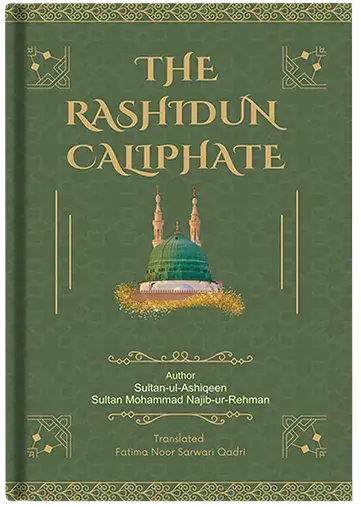
Sultan-ul-Ashiqeen writes
When Syrians did not agree to give access to water, this provoked a fight between the Syrian and Iraqi troops. The Syrians were defeated and Ali captured the river and then made it accessible for both armies. Hence, both the troops equally quenched their thirst. (The Rashidun Caliphate Page 207)
Owais al-Qarani’s Participation in the Battle of Siffin
It is narrated from Said ibn al-Musayyib that Umar ibn Khattab said to people of Qaran on the pulpit in Mina, “O People of Qaran tribe!” So some elders got up and said, “Commander of the Faithful! We are people of Qaran.” Umar asked, “Is there a man named Owais in this tribe?” An old man said, “O Commander of the Faithful! Among us there is only one mad man named Owais and no one else. He lives in deserts and forests and has no friendship or relationship with anyone.” Umar said, “Yes, this is the person I was looking for. Once you return to your tribe, locate him, give him my regards, and tell him that the Holy Prophet (pbuh) gave me glad tidings about you and has commanded me to give you his greetings.”
After arriving in Qaran, those individuals looked for him and discovered him among the sand dunes. They greeted Owais with the greetings of the Holy Prophet (pbuh) and of Umar (RA). Owais Qarni asked, Does Commander of the Faithful recognise me and has he taken my name? Then he sent greetings to the Holy Prophet. “O Allah! Send down your blessings on him and his progeny.” Subsequently, Owais began to travel aimlessly, leaving no trace behind. Then, during Ali’s Caliphate, he reappeared, took part in the Siffin Battle beside Ali’s army and ultimately met his martyrdom.
(Kanz-ul-amal, 37829)

Martyrdom of Ammar ibn Yasir
In Sahih Muslim, it is narrated from Umm Salamah (RA) that the Messenger of Allah (pbuh) said: “Ammar (RA) will be martyred by a rebellious group.”
Imam Bayhaqi narrates from Ibn Masood (RA) that the Messenger of Allah said: “When people will be in discord, Ammar (RA) will be with the group that is on the righteous path.”
Ammar (RA) was with Ali ibn Abi Talib (RA) in the Battle of Siffin. He was martyred by Abu’l-Ghadiyah from the party of Muawiyah.
(Tarikh Ibn Kathir, Volume 3, Part 6, Page 516)
Maulana Maududi writes:
Something happened during this conflict that made it very evident who was right and who was not. The incident involved Ammar (RA), a soldier in Ali’s (RA) army who was martyred while fighting with the army of Muawiya. Many Companions had heard the Holy Prophet declare, “O Ammar! A rebel group will kill you,” directly from his lips. This declaration regarding Ammar was well-known among the Companions.
(Khilafat o Malokiat, p. 136–137)
Imam Tabari wrote:
Muhammad ibn Abbad ibn Musa, citing Muhammad ibn Fudayl and Muslim al-A’war, narrated from Hubba ibn Jawayn al-‘Urani:
“I and Abu Masood (RA) went to Hudhayfah (RA) in Madain. He congratulated us and said that among the Arab tribes, there is no one dearer to me than you two. I leaned on Abu Masood, and then we both said, ‘O Abu Abdullah! We fear the tribulations (fitnah). Please narrate to us a hadith.’
Hudhayfah (RA) said: ‘Join the group in which Sumayya’s son Ammar is, because I heard the Messenger of Allah say that a rebellious group that has deviated from the truth will kill him, and his last sustenance will be milk mixed with water.’
(Tarikh al-Tabari, Volume 3, Part 2, Page 231)”
This hadith, according to Muawiya, states that Ammar was assassinated by the same people who had taken him to the battlefield.
Ibn Kathir writes:
The interpretation and explanation by Amir Muawiyah is far-fetched and implausible.”
(Tarikh Ibn Kathir, Volume 3, Part 6, Page 517)
Maulana Maududi writes:
The Holy Prophet did not say that Ammar would be brought to the battlefield by the rebel group; rather, he said that the rebel group would assassinate him, and it is obvious that he was assassinated by Muawiya’s army and not by Ali’s army.
(Khilafat o Malokiat, p. 931)
According to Muhammad ibn Amara:
On the day of the Battle of Camel, my grandfather, Khuzaima, kept his weapon in its sheath. However, after Ammar was killed in the Battle of Siffin, he took out his sword and continued to fight until he was martyred. He used to say that I heard the Holy Prophet saying that Ammar would be killed by a rebel group. (Musnad Ahmad, 22217)
Musaddad narrated to us, saying that Abdulaziz ibn Mukhtar narrated to us, saying that Khalid Hadhdha narrated to us from Ikrimah, who narrated that Ibn Abbas (RA) said to me and his son Ali to go to Abu Sa’id al-Khudri (RA) and listen to his hadiths. We went and saw that Abu Sa’id was working in his garden. When he saw us, he adjusted his cloth, sat down, and started narrating hadiths to us.
When the construction of the Prophet’s Mosque was mentioned, he said that while participating in the construction, we would each carry one brick, but Ammar (RA) was carrying two bricks. The Prophet (pbuh) saw him, he began to dust the dirt off Ammar’s body and said: “Alas! A rebellious group will kill Ammar (RA). He will invite them to Paradise, but they will invite him to Hell.” Abu Sa’id al-Khudri narrated that Ammar (RA) used to say that he sought refuge with Allah from tribulations (fitnah). (Bukhari 447)
Umm Salamah (RA), who said:
It is narrated from Umm Salamah (RA), who said: I have not forgotten what the Messenger of Allah said on the day of the trench (Battle of the Trench), while he was handing bricks to the Companions (RA), and the hair on his blessed chest had become dusty. He was saying: “O Allah! The real goodness is the goodness of the Hereafter, so forgive the Ansar and the Muhajirun.” Then the Prophet (pbuh) saw Ammar (RA) and said: “Alas for the son of Sumayya! He will be killed by a rebellious group.”
Hasan ibn Sirin said:
I mentioned this hadith to Muhammad ibn Sirin, and he said: “Did the Prophet mention Ammar’s mother’s name?” I said: “Yes, because she (Sumayya RA) used to visit Umm Salamah.” (Musnad Ahmad 27015)
Ibn ‘Awn narrated from Hasan, who narrated from his mother, and she from Umm Salamah who said: The Messenger of Allah (pbuh) said: “Ammar will be killed by a rebellious group.” (Muslim 7320)
Abu Hurairah (RA) said that the Messenger of Allah (pbuh) said: “Ammar, a rebellious group will kill you.” (Tirmidhi 3800)
Ibn Kathir writes that the person who martyred Ammar came to inform Muawiyah:
The narrator says that while some people were present with Muawiyah, two people came arguing about the martyrdom of Ammar (RA). Abdullah ibn Umar (RA) said to them: “Whoever among you wants to please himself by claiming the martyrdom of Ammar over his companion, let him do so. For I heard the Prophet (pbuh) say that Ammar will be killed by a rebellious group.”
(Tarikh Ibn Kathir, Volume 4, Part 7, Page 862)

Virtue of Ali ibn Abi Talib (RA)
Ibn Kathir writes:
In one narration, it is mentioned that Abu Darda and Abu Umama both went to Muawiyah and said, “O Muawiyah! On what basis are you fighting this person? By Allah! He embraced Islam before you and your father, he was closer to the Messenger of Allah than you, and he is more deserving of the caliphate than you.”
(Tarikh Ibn Kathir, Volume 4, Part 7, Page 259)
According to Tabari, Amir Muawiyah and Amr ibn al-As were also aware of the virtues of Ali (RA):
Amr ibn al-As came to Amir Muawiyah in private and said to him, “I am amazed at you; I am prepared to support you, but you turn away from me. By Allah! If we demand retribution for the caliph, we will have to fight the person whose early acceptance of Islam, closeness to the Messenger of Allah, and virtues you are well aware of. But we have chosen the world.” Hearing this, Muawiyah reconciled with him and inclined towards him.
(Tarikh Tabari, Volume 3, Part 2, Page 181)
Shah Waliullah writes:
As regards to the question of Muawiya being the religious interpreter at fault and excusable, the answer is that his argument was based on doubt. However, the other argument that was weightier on the scale of sharia manifested afterwards.
(Allah Al-Khaf, Vol. 4, p. 525)
Defeat of Muawiya and Holding the Quran on Spears
Both armies reached Siffin at the beginning of the Islamic month of Dhu al-Hijja in 36 AH. This month, minor skirmishes persisted, but no one emerged victorious. Then a total ceasefire was declared in the month of Muharram, the new year. The war started as soon as Muharram concluded. The battle raged on for several days. When Muawiya’s army noticed signs of defeat around a week later, they elevated the Quran on their spears in an effort to prevent defeat. To end the conflict, they demanded to make decisions based on the Quran.
Tabari writes:
According to Abu Mikhnaf, Amr ibn al-As told Muawiya when he saw that they were heading towards destruction as the Iraqis were gaining ground, “I present to you an opinion that our unity will increase and chaos will arise among enemies.” Muawiya said, “Yes, elaborate.” Amr ibn al-As said, “Let us pick up the Quran and declare that we and the opponents shall accept whatever decision the Quran makes. There will be a group among the opponents who will accept the verdict, even if a small number of them choose not to. There will be a split among them in this manner. If everyone agrees, then this war will temporarily cease.”
The Quran was raised to their spears by the Syrians, who declared, “This book is decisive between us and you.” Both the Iraqis and the Syrians will make decisions that affect the entire population of their respective countries. When the Iraqis saw that the Quran had been raised, declared, “We accept the Book of Allah and turn to it.” (Tarikh al-Tabari, Volume 3, Part 2, pp. 241-240)
Ali (RA) Was Opposed to Ending the War
Ali (RA) knew this deceit well. Numerous people disregarded Ali’s request for the war to continue.
Ibn Kathir writes
Ali’s companions replied, “We are not capable of declining the invitation of the Book of Allah.” Ali said to them, “Since they have rejected the Book of Allah, broken this agreement, and disregarded God’s decree, I am struggling with them to get them to embrace the verdict of the Book of Allah.”
(Tarikh Ibn Kathir, Vol. 4, Part VII, p. 271)
They even threatened to kill Ali.
Ibn Khaldun writes:
Masar ibn Fadak Tamimi and Zayd ibn Hussain al-Tai, along with those who later entered the sect of Kharijites, said, “O Ali! Accept the Book of Allah; otherwise, we will leave you and deal with you the same way we did with Ibn Affan.” Ali said, “If you are submissive to me, continue fighting as equals, and if you want to be rebels, then do what you want.”
(Tarikh Ibn Khaldun, Vol. 2, Part I, p. 419)
A message was sent to Ali’s companions who were battling ahead and were nearing victory, urging them to return or Ali would be martyred. Ali’s companions claimed they were as near to victory as it takes to milk a camel.
Objection to Ali (RA) and his Response
People further argue that if making a ruling was wrong, Ali would not have volunteered to make one.
In this regard, it is stated that Ali had been against stopping the war since the beginning. They used to manipulate him. Ali consented because no one else was standing with him; just a few people supported Ali. Ali gave the solution himself.
Tabari says:
Swear to God! I didn’t agree to this agreement, and I disliked it, unlike you people. When you people refused to accept anything except the agreement, I agreed. (Tarikh al-Tabari, Volume 3, Part II, p. 253)
Abu Musa Al-Ashari and Amr ibn Al-Aas
It was critical to end the war by first defying Ali’s orders. Then, when it was claimed that both sides should choose their own arbitration, Ali announced that they would appoint Abdullah ibn Abbas as their arbitrator, but this order of Ali was also not obeyed. Abu Musa al-Ashari was appointed arbitrator. Ali was opposed to this concept, but no one followed his orders.
Ibn Kathir writes
Ali intended to appoint Abdullah ibn Abbas as arbiter, and if only he had done so, his reciters, whom we have already mentioned, said, “We will not agree to anyone except Abu Musa al-Ashari.”
(Tarikh Ibn Kathir, Vol. 4, Part VII, p. 274)
Tabari writes that Ali said
You disobeyed me before, but please do not do so again. I do not wish to make Abu Musa an arbiter.
(Tarikh al-Tabari, Volume 3, Part 2, Page 245)
When Abu Musa was nominated as an arbitrator, he claimed that he had avoided the war.
Dr. Taha Hussain writes
Perhaps he didn’t realise, when making this point, that Amr Ibn Al-Aas had not only participated practically in the war but also dedicated his mental abilities.
(Hazrat Ali Al-Murtaza, p. 232)
Dr. Taha Hussain writes
When Ali attempted to address this matter diplomatically by sending diplomats to him, he unsuccessfully returned them and stated that the choice would be made only by the sword, and when the sword was used, he elevated the Quran.
(Hazrat Ali Al-Murtaza, p. 232)
Resurrection of Sunna of Hudaibiya
When the covenant was written, Ali was not mentioned as the Caliph of the Faithful. Ibn Khaldun writes,
Amr Ibn Al-Aas came to Ali Ibn Abi Talib to write terms of agreement. After “Bismillah,” the scribe wrote, “This agreement is written on the order of the Caliph of the Faithful.” Amr Ibn Al-Aas immediately took hold of the pen and said, “We do not consider him our Caliph.”
Ahnaf: Do not erase the title. This act seems ominous to me.
Ashath: Be sure to erase the title!
Ali Ibn Abi Talib: Allah the Great! A similar incident happened while writing the treaty of Hudaybiyah. The infidels did not allow to write “The Prophet of Allah” with the blessed name of our Holy Prophet
(Tareekh-e-Ibn Khaldun, Vol. 2, Part I, p. 421)
Tabari writes that Ali addressed his army, saying:
You have done something that has exhausted your strength. Your favours have gone, you have grown lethargic, and you have inherited the laziness and disgrace. When you were elevated and your adversaries were terrified of the competition, were murdered, and were in pain from their wounds, those individuals picked up the Quran and encouraged you to adopt its rules. So you withdraw your hands from them, the conflict between you and them ends, and they wait for you like deceivers to fool you. You fulfilled their wishes. (Tarikh al-Tabari, Volume 3, Part II, p. 250)


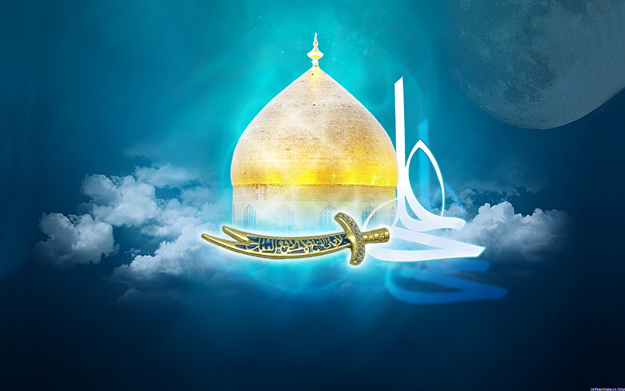
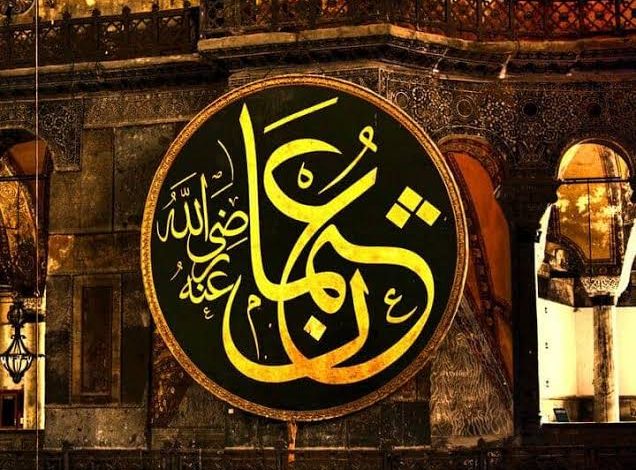







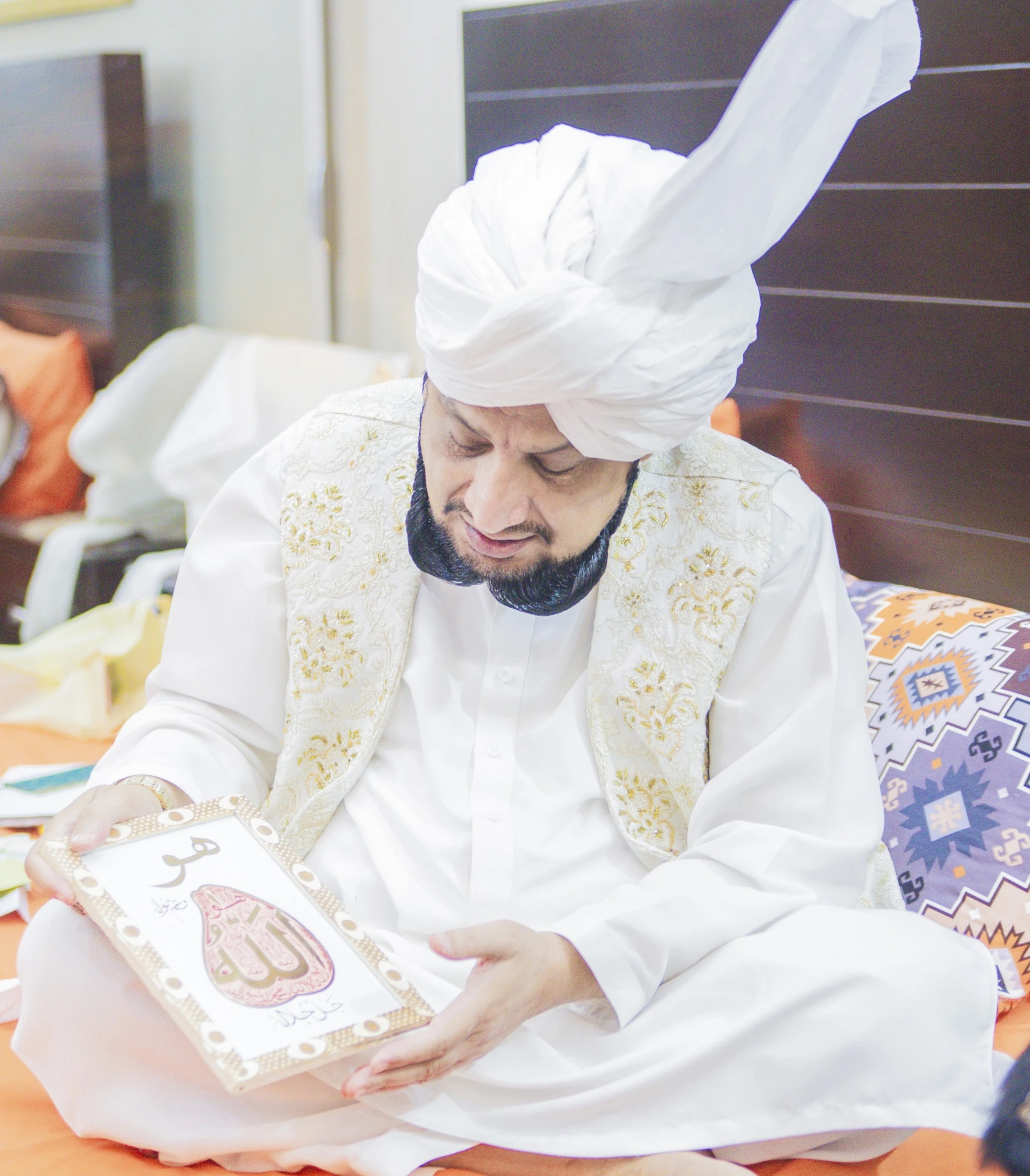
Beautiful article. There is a lesson for us in the life of the sacred Companions and in particular the Rashidun Caliphs.
Very informative article beautiful ❤️
The era of Ali ibn Abi Talib’s caliphate is one of the most difficult times in the history of Islam. However, the events that took place during that time had their roots in previous caliphates.
Very nice and informative article. Gained much knowledge
Heart touching article thank you for sharing with us ❤️
Ibn Khaldun wrote,
The Egyptians said to Ali, “We are disgusted with the rule of Usman. We want to pledge allegiance to you. We are going back now.”
Great artical 🌷
A true saint!
Behtareen ❤️
Informative article
Very informative and Great Article..❤️❤️
Sultan-ul-Ashiqeen says
Those who gave their lives were ready to protect him (Usman) at any cost but he stopped them all. (The Rashidun Caliphate p.139)
Very Informative Article. Thanks Alot
Very informative
Allah pak humay Ali ra ki talemaat pe amal karne ki taufeeq dey Ameen
All the objections on Hazrat Ali (ra) are completely wrong and misleading. The accusers are irrational and hostile towards Hazrat Ali (ra) who have existed in every age but their names have been changing.
فَسَيَكُفِيكَهُمُ اللهُ وَهُوَ السَّمِيعُ الْعَلِيم (سورة البقرة 137
ALI’S LOVE FOR USMAN
Usman’s water was cut off by rebels. He sent word to the Companions that water was required. Ali placed water bottles on an animal and proceeded towards Usman. The accusers were unaware that Ali had sent his beloved sons, Hasan ibn Ali and Husayn ibn Ali, to guard the outer entrance of Usman’s house and gave them orders to prevent any rebels from entering.
Sultan-ul-Ashiqeen says
Those who gave their lives were ready to protect him (Usman) at any cost but he stopped them all. (The Rashidun Caliphate p.139)
The era of Ali ibn Abi Talib’s caliphate is one of the most difficult times in the history of Islam. However, the events that took place during that time had their roots in previous caliphates.
An informative and truely guiding article.
👍👍👍
❤❤
Sultan-ul-Ashiqeen says
Those who gave their lives were ready to protect him (Usman) at any cost but he stopped them all. (The Rashidun Caliphate p.139)
Those who gave their lives were ready to protect him (Usman) at any cost but he stopped them all. (The Rashidun Caliphate p.139)
Ibn Sa’d has written that when Usman had 700 companions and was being besieged by 600 people, he rigorously prohibited any of them from engaging in fight. (Tabaqat Ibn Sa’d Vol. II, p. 142)
Ibn Kathir writes, “Usman told his followers that whoever sheathes the sword will be free.” (Treekh Ibn Kathir. Volume IV, Part VII and VIII, p 183)
Nice article
Sultan-ul-Ashiqeen says, “Prophet Mohammad had foretold Usman that he would be martyred. He had firm belief that it would come true one day so he patiently waited for it.
Very informative article
Very well written
Very informative article
When the Holy Prophet mentioned about fitna, he said that he (Usman) will also be martyred it.” (Tirmidhi 3708)
Very well explained and very heart breaking to read what pain the Khulafa Rashidun had to bear!